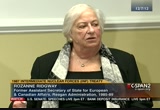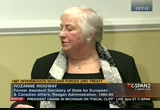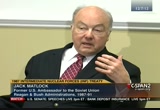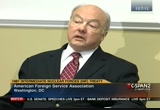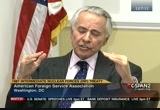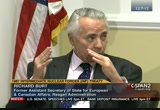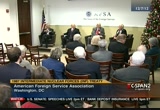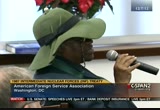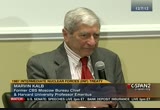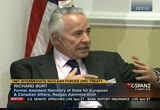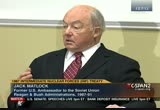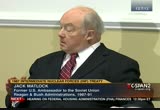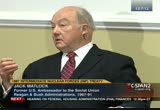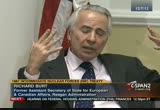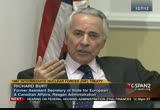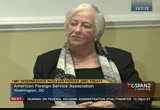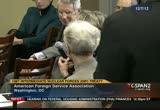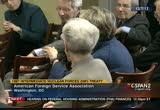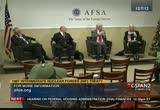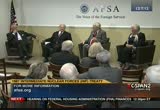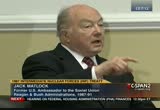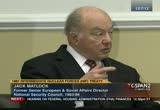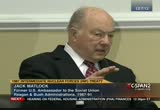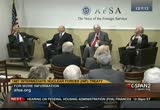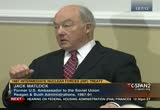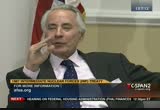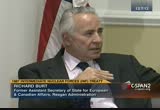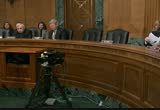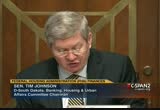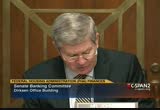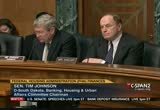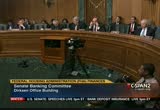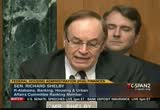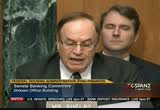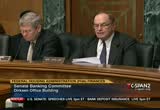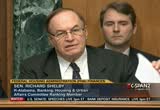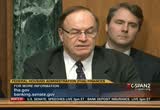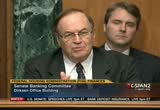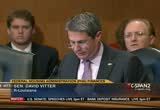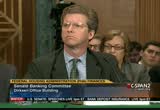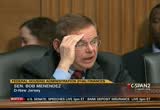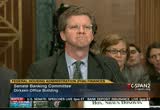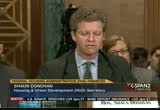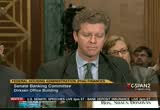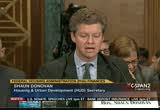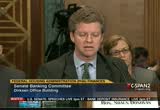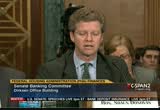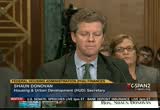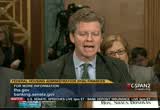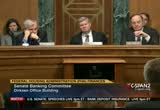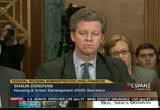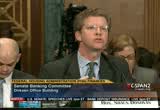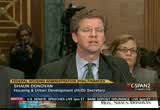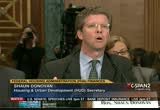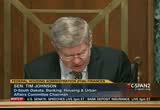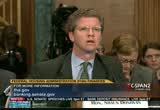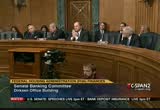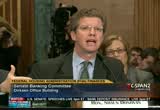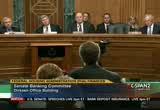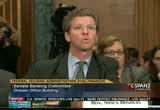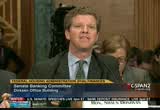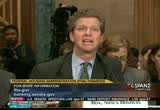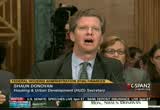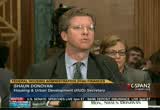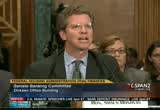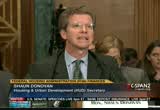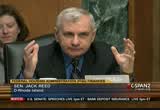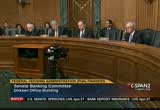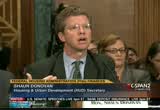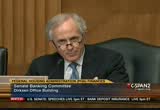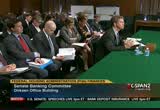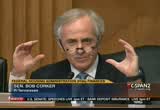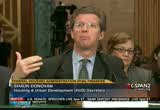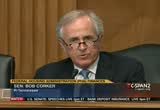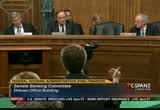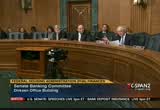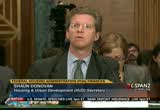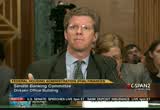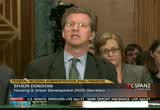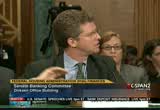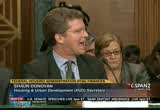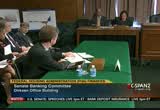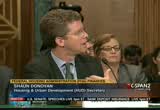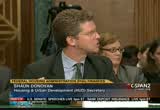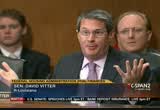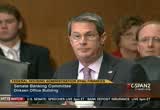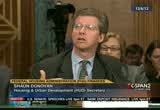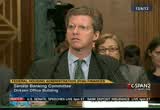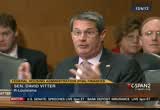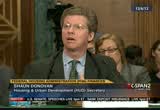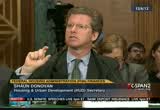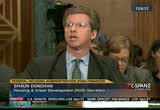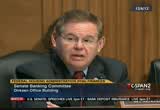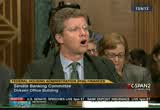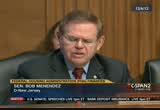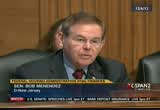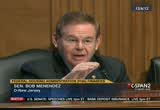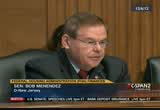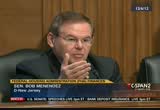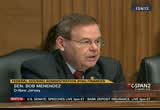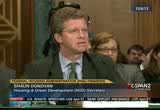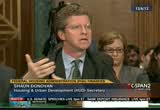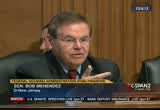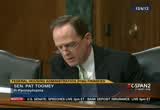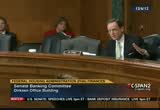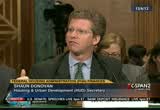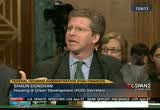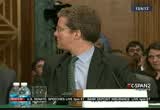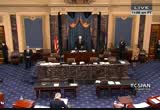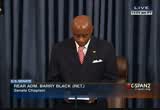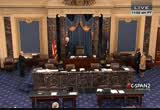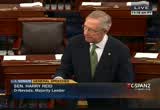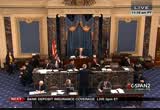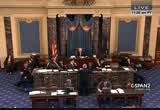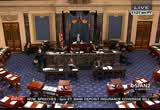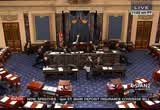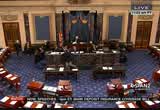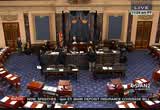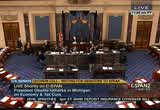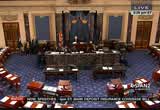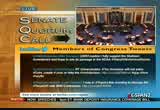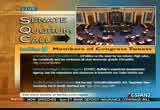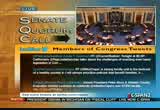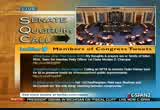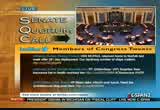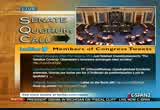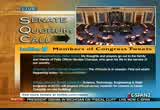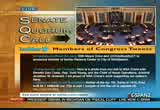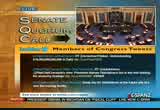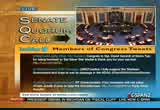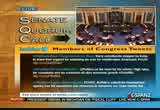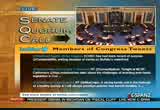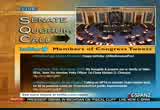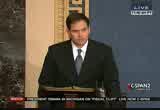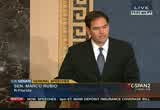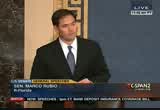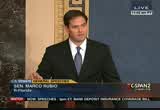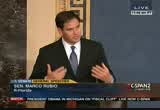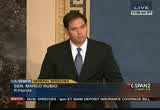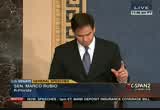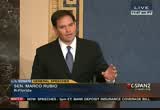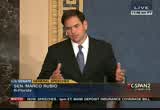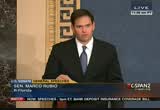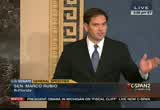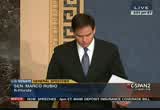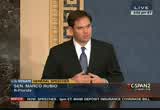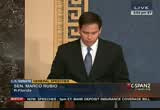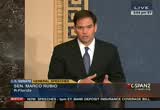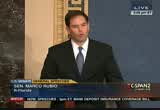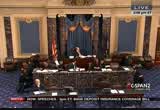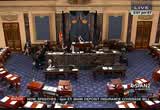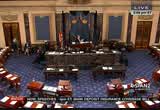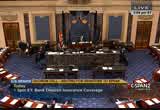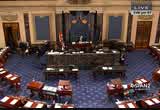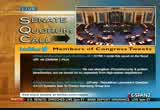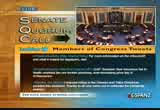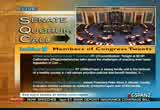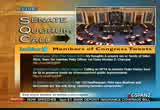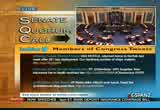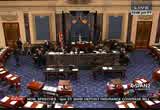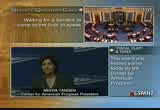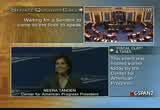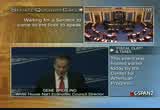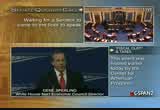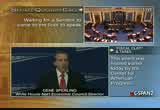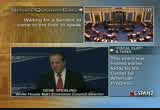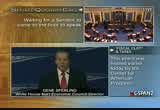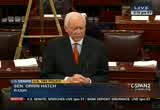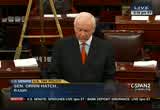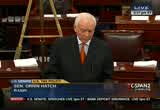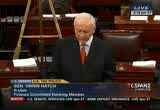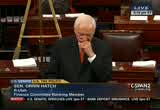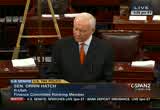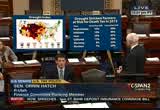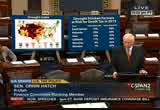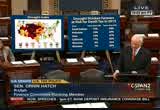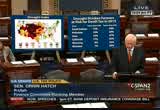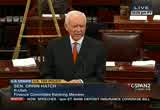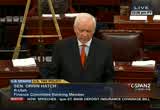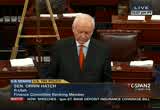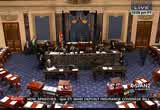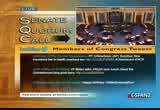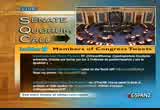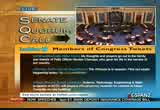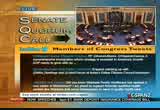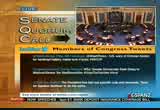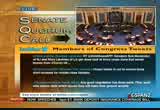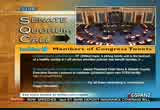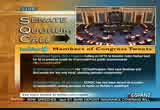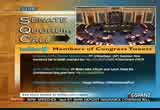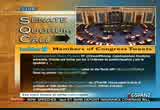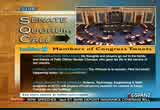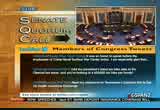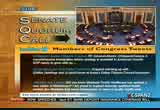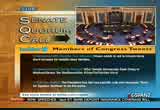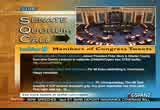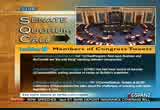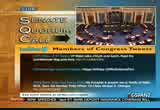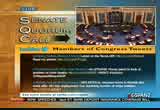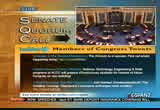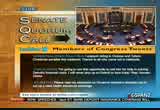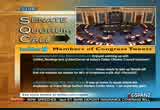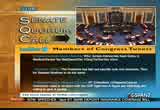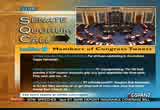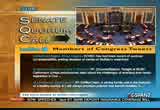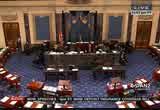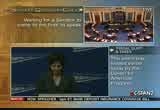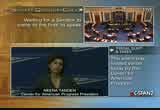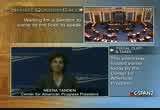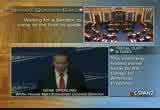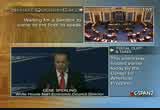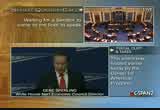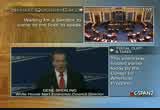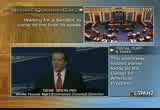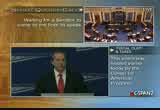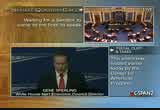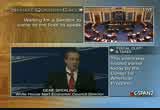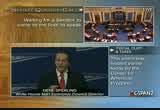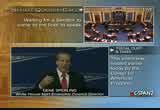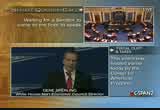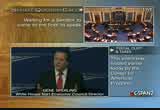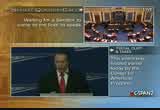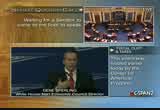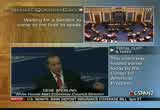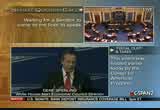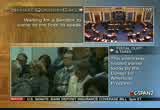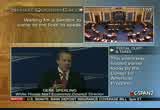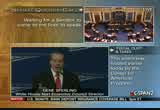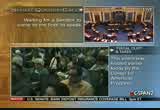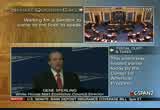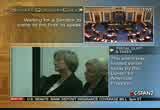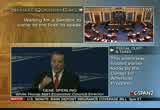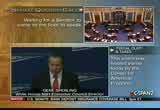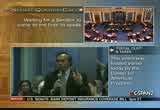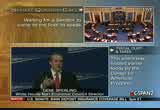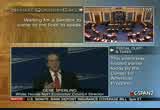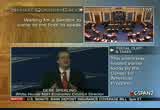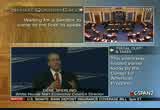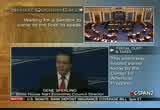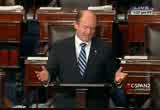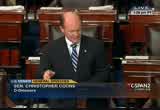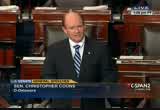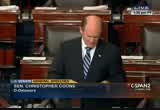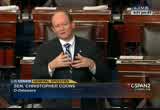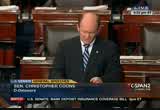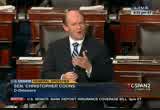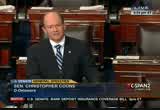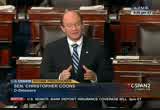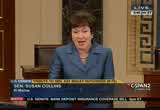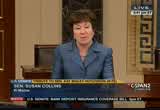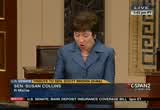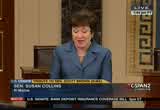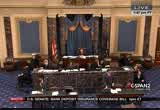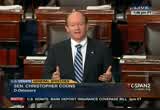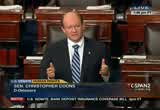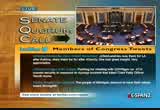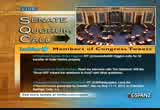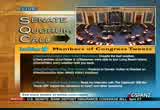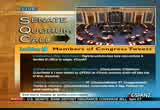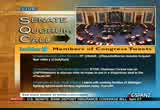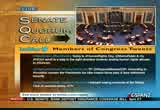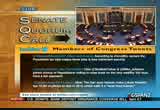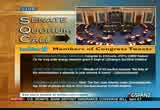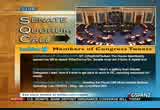tv U.S. Senate CSPAN December 10, 2012 12:00pm-5:00pm EST
12:00 pm
we had spent 40 years saying that berlin was not the capitol of the german democratic republic and we weren't about to yield on that at the last minute. so the agreement was signed and so on and their other side stories that don't need repeating, but the point in all of this was that the united states in this negotiation, reagan, schultz the whole team that agreed that this was a good thing to do and there is still a population in this town that did not think this was a good thing to do, knew what they wanted and they were prepared to walk away. the firmness of their resolve and their determination to see it through and to take the risk of saying no, we will not proceed on that basis, yes we will proceed on another basis, i think were as important as the
12:01 pm
very real personalities involved. >> thank you very much, ros. a question for jack. in your study of the end of the soviet period, what role did the inf negotiations, the whole process, play? as the soviet union teetered toward an end to? >> i am not sure it had that much direct effect. i would say that ending the arms race, because this was the beginning of ending the arms race and you know it really took the s.t.a.r.t. treaty and a series of others to do so, and it took the liberation of eastern europe and, which went as a separate process. but, i would say that these things actually freed up gorbachev to try to reform the system. it took the pressure off of him.
12:02 pm
as long as we had the arms race, they had an excuse not for changing the system, but once you and the cold war, not just the arms race, and gorbachev ended it ideologically december 7, 1988, today is also an anniversary of that -- exactly a year after he signed the inf treaty, what he ended in that speech aside from announcing unilateral reductions in their military, was he discarded the class struggle as the rationale for soviet foreign-policy. that was the rationale that also cut the khan eunice party as the dictatorship in the country. so the end of the cold war reforms that gorbachev started these reforms when i got out of hand, brought the end to the soviet union. they got out of hand and got out
12:03 pm
of control, and the end of the soviet union in my opinion was caused almost entirely by internal forces and these were unleashed by the end of the cold war, beginning with the the inf treaty. >> ros do you share that view? >> i do and maybe have two words that we have not used throughout this that were so popular at the time with respect to understanding what gorbachev was trying to do. perestroika and -- and he was attempting to change the soviet union internally even as he was in gauge with us and talking about forces out of control, that is a lot to have going on at the same time and it's in many respects a wonder he held onto it for as long as he did. >> rick, you mentioned earlier on that the russians made a fundamental mistake when they moved the ss-20's in. where they're in a fundamental mistakes that the u.s. president made?
12:04 pm
>> you know, i think on the management of this issue like i said we almost ran into a couple of issues here. but we kept it on the road. i have to say, because you know i think about the last 20 years, 30 years of u.s. foreign-policy, in particular in the last 10 years. i to call it the disciplining impact of working within the alliance. we were genuinely, because this was an alliance, both on the negotiating side because in order to deploy in these countries, government suppression had to take ownership for the negotiation. they weren't going to be sitting at the negotiating table but there was a group that nato called a special consulted the group that enabled these people to go back, the governments in question and say you are part of this process. we are not we are not going to let those americans do these
12:05 pm
things and i have to tell you there were so many people in the reagan administration that were unhappy hearing the state department arguments over and over again. we can do that because it will disrupt our deployment efforts. so somebody had some wacky new neutron bomb they wanted to deploy or something like this. we could go to the president and tell him, this is going to make inf deployment and their arms control efforts that much more difficult. most foreign-policy issues that washington has to address and any administration has to address, allies are taking account but not in the same way they were in this whole inf trust us. >> go ahead, ros. before you go, if you all have some questions, this is your moment in the sun. just raise your hand and i will try to recognize you.
12:06 pm
>> taking into account the many people who have dealt with united states and we understand this is just a subtle brush off. in the case of the allies, these were very strong leaders and they insisted on their views being taken into account and being a part of what we were doing. >> okay, please raise your hand if you have a question. >> there's a shortage of microphones. >> anyone who has a question, please raise your hand. >> thank you, on the right. >> please give your name if you would, please. >> thanks to roz ridgway who was my -- years ago. you said they wrote the history. is there any hope today that we still have big people, men or
12:07 pm
women on the scene, who can write some history because we have got a lot of problems. someone mentioned iran. there is iraq and afghanistan. we have got these things out there with no exits. do we have big people? >> thank you. ros. >> i think we will when we need them, but we have not given credit to history bringing an issue to a point where it is ready to be resolved. you cannot just march in and be a big person and bring all of us this together and solve it. there is a ripening of an issue and a readiness for people to talk, more than one person to talk about a. >> i would say there is certainly a ripening of the issue of iran, which has been ripening for years now and there are many presidential statements that have been made that a determination as a part of the
12:08 pm
u.s. never to allow iran to develop nuclear weapons. during the presidential campaign, we heard back from both candidates. so, is there a lesson that we have picked up from a inf negotiations that could be applied today as we look ahead to the iran negotiations? >> well, i mean from one perspective i would say yes. that is, that there is a kind of dual-track. some people would say there are more than two tracks here, but the situation that is in play with iran now is similar in the sense that you have got sanctions policy that is putting heavy pressure on the iranian regime in the same way the threat of the u.s. deployment of cruise mitchell's -- missiles so there is an incentive that the iranians have to seek a solution
12:09 pm
in the absence of the sanctions wouldn't exist. on the other hand you have the diplomatic track. what is missing here i think it it is, it's arguable how active the diplomatic track has actually been. i am struck by for instance the fact that the european's who have been involved in this process all along in p5+1, i think have largely led to the timing and the pace to be set by the united states. it's going to be i think the obama administration skal, especially with the external pressure of the israelis kind of constantly hovering out there and netanyahu's talk about a red line. when is the united states going to get really serious about the second track? i am one of these people who believes there is an agreement
12:10 pm
out there that could be reached. and that would lead to a non-nuclear weapons in iran. but, i think the diplomacy has to be stepped up. jack's final point, jack's point about a republican conservative able to achieve agreement of this sort that are more difficult for a democrat is a very important one. no matter what kind of agreements, if there is an agreement reached with iran, it's going to be attacked by a lot of constituencies but many of them are going to be republican. >> i could give you many examples where democratic president has reached -- -- [inaudible] >> regarding iran, i think in any situation, you have opportunity possibly.
12:11 pm
there are other times where the personalities make it simply impossible. we should not have negotiated with hitler. it would not have helped in the 1930's. but, the thing is, as far as iran is concerned, i think there are lessons and one is that the time to negotiate with iran was when they had a relatively moderate government in 2003 before we attacked iran. now you do them a great favor of taking out their main enemy, without apparently any negotiation whatsoever. now, i think we could have made a very useful deal with iran after 9/11. after all, al qaeda is their enemy. iraq was their enemy. we had a lot of things in common
12:12 pm
then, so the timeless 2003. now, with ahmadinejad there and all of the things in history, i don't think that it is going to be that easy particularly to do public negotiations, given the political stance that both have made. but, the basic principle is, we should have been looking for a strategic dialogue with iran and i would even go back to the '90s, and i think that was also a mistake of the clinton administration, when they had the double containment, which i never thought made much sense. but the fact is that both parties have taken positions that have made it extremely
12:13 pm
difficult now to achieve negotiations. however i think rick is right. in my opinion, there is a solution out there, but we have an effect locked ourselves in and they have locked their selves and politically in a way that's going to make it very difficult. >> let's hope lets hope that you are both right in the solution that is out there somewhere. >> hi, my name is james wilson and i work in the historian's office in the united states series with my colleague elizabeth charles. we are putting together volumes of primary documents on the soviet union and arms control and you can actually look through a number of the old office files in the number of people in this room of great historical interest. my quick question is that in january 1989, new administration comes in and there are a number of people who had been, had played a role in 1970 -- if
12:14 pm
there seems to be a real change in attitude towards the soviet union. it's always been a lingering mystery to some of us. >> in fact, you are right. because i ate in the bush administration negotiated the s.t.a.r.t. i treaty and there was a lot of people, there were a lot of people befuddled by the fact that it was a white house group mainly in very good people like brent scowcroft and arnie can't who were taking a very skeptical approach suddenly to the russians and there was a view, and i think god bless him, brent scowcroft was really believed this that ronald reagan
12:15 pm
was kind of fell in love with this process of gorbachev and that they weren't kind of clear minded enough, clear-eyed enough about the russian. bob gates also, who moved over to national security. that little group kind of delayed the process i would say for about six months. the people let state i think were ready to kind of progress, you know, with what had been achieved toward the end of the second reagan administration. but it just really delayed things, because the person who turned that around, and he also deserves a great deal of credit, was jim baker. jim baker did a great job putting together kind of an inter-agency management for this process and the different players and he spent a good deal
12:16 pm
of time, i would say a year and a half or two years, arrived in moscow with an entourage with the negotiators from cfd of the relevant assistant secretaries. broke them into working groups and i think that process that ros participated in with schivinovski and gorbachev but there was a delay and i don't think it set us back. i don't think there were any problems as a result of that. >> thank you. >> i was just going to say that james baker was named secretary of state the day after george bush was elected. within a week he met with regional assistant secretaries to understand their priorities. there were opportunities and challenges to include eastern europe and the soviet union and i am on record as having said and i will say it again he said
12:17 pm
to me ros don't you really believe that you push the president to fast? don't you believe you have gone too far? i said no i do not believe that. the administration changed. we were asked to do an inter-agency study. we turned and one that showed continued the same path and we were laughed out of town. rick says we lost six months and i think we lost two years. >> on this point, let me just say that i think we lost our momentum with the iran-contra during the reagan administration. >> thank you. >> the ambassador wanted to say something here. do you have a microphone up front? okay, right here please. thank you. >> i was involved in the inf in that capacity. i think one of the lessons, part
12:18 pm
of inf that really relates to iran is don't be afraid to negotiate. i mean, we argued we had no choice the allies would be deployed without an arms control -- to but the soviets did not know that so they put themselves in a corner. i think jack and all of you mentioned that there might have been an opportunity with iran that we simply missed and entangled ourselves in these -- before we negotiated with the iranians. [inaudible] i think the question is whether we would not have done, engaged. as rick mentioned, at the
12:19 pm
beginning of the reagan administration, there was a desire on the part of the new administration to stop the arms control and it was only the allies -- [inaudible] >> thank you very much. the question in the back. yes, please. thank you very much. >> i am dan wittmann. >> if you could stand up, please. >> yes, let me know if this is off-topic but since we have been talking about lessons learned i believe there was an os cd meeting in the last couple of days in dublin and the russians and the americans and the secretary of state met with somebody. it was not lavrov but it was somebody. is it possible that something may be happening in terms of the russian policy toward syria? since we have mentioned iran can we get as far away as syria?
12:20 pm
>> you can get as far away as syria i hope with some connection. i do appreciate that but the question of syria is of totally sufficient importance so we could address that and thank you for the question. my own gut feeling and i don't know how you guys feel, but the russians have been for the last several weeks, there have been indications of unhappiness with what is going on in syria without a clear sense of what it is that they can can shape it and whether they can do it on their own or with the u.s.. the u.s. has always wanted the russians to be part of that kind of a solution. if there could be one at all. so, if the russians in any way are moving toward the american decision with respect to syria, i think we are all better off for it.
12:21 pm
okay, another question out there? there is one right up here. and then we will assume that is the last question. >> i wonder if, you all alluded to it and i wonder if we could call the diplomacy -- moving towards the inf negotiations? >> i remember it very well and i think it was sort of the diplomacy not with respect to the allies. we very carefully stayed in touch with the allies but the practice meeting by meeting by meeting with the soviet leadership was a complete shutdown on common to the press until the meeting was over. >> amen. [laughter] if i may say that was one of the great bloopers that you all did at that time because you may have had great volitions with
12:22 pm
the allies but you didn't let the american public. >> i don't know about the american public. >> the american public was was ill-informed about what it is that the u.s. government was trying to do. there was a huge uproar and if you listen very carefully, there was a sense that the government did not know exactly what it wanted to do. it was confused and without a sense of direction that maybe you wall had a clear sense of direction. >> we had a clear sense and you told -- we told you but you just didn't believe us. at geneva i sat down with a group of bankers and you were not one of them, and one of them asked, you know, we didn't know this was coming. i said, the president made his speech january 16, 1984. this was more than a year and a half before and most of your people said he was playing
12:23 pm
politics. he set forth in that speech what he wanted to do and i think we were very open. it was simply that the press was extraordinarily, i would say skeptical that the president knew what he was doing. now, there's another side to public diplomacy, and how about the soviet union? ros has mentioned the important agreement at geneva that a nuclear war cannot be won and must not be fought. there was also an extremely important agreement to expand exchanges of all sorts. we had an exchange agreement from the nixon administration, which had lapsed during the carter administration, because of the invasion of afghanistan. we cut off our changes over that and i never understood it. we got it restored, much expanded and the question then
12:24 pm
was, will gorbachev allow this to happen? he did, and gradually with the policy of glasnost he began to open up the press. he brought in new editors for most of the publications. they started having westerners, including by 1987 the american ambassador, very frequently on their national television. so we began to communicate directly with the soviet people. both media, private media but also our officials and much more so and i think this played a very important role in easing the tensions, because when you have westerners discussing sympathetically their problems, often in their own language, this was conveying the opposite image of the one of hostility. and i think this played an important role in the american
12:25 pm
public and the soviet public in supporting what gorbachev was trying to do. >> thank you, sir. what i would like to ask our panel is simply, take one minute each and give me your sense of the lessons learned on the entire inf experience and how they might apply to today or some lesson that is learned, perhaps just -- and i'm going to start by asking myself this question. how could the anchors in 1985 have been so foolish as to believe that a president at the beginning of a presidential campaign, making a foreign-policy speech that was almost totally different in tone than the soviet union than the tone he took in the first three years, have to have in mind the policies might have something to do with it.
12:26 pm
but to be so skeptical. so, let's start with ros. >> a minute on the impact of inf? >> the lesson learned. >> i think the principle lesson learned and looking some of the things we talked about here is that you must know total range of your interests interest and you must be prepared to serve all of them equally well and not allow yourself to get tangled up in setting conditions that no one can meet, unless it is your objective to avoid negotiations. but if you want negotiations you must make it possible for your negotiating partner to get to the table. >> thank you very much. jack. >> the one that i would take away is the importance number one, of eliminating weapons rather than putting a limit on them and second verifying that. it's much easier to verify zero then any concrete number.
12:27 pm
and therefore, i think we really have to get our minds off simply putting limits on types of arms, but trying to get rid of those that we don't want. we are facing now a possible problem of syria using chemical weapons. they should have been abolished five or 10 years ago if the treaty had been enforced. and so, it seems to me abolition of these weapons with good, thorough verification. it worked with inf despite the fact that two or three years before we got it, there was almost no -- that would be accepted. >> well, as the chairman of global zero usa, i have to agree with jack.
12:28 pm
[laughter] i won't expound on that. you know, there was no way when i was deeply involved in the issue with the europeans that i could have foreseen gorbachev, nor could i have foreseen the treaty. in fact, i thought the zero option was preposterous. i opposed it. so did the secretary of state. we viewed this, and i guess this was the lesson, we viewed this as largely a challenge and an opportunity to strengthen the alliance. we saw ourselves under threat. the double tracked decision in deploying the missions was part of a broader political military exercise to strengthen the alliance, so that we could deal with whatever the next challenge we would face from the soviet
12:29 pm
union. what i have to say is that you have to learn to pivot, and that is exactly what the reagan administration did when they found themselves with somebody they could do business with. it pivoted and ronald reagan, may have been the only guy in the administration that really believed in the zero option but by god, he went after it and here i have to agree with ros, somebody, a big man with big vague thoughts, if you are president of the united states, you can achieve a great deal. >> thank you very much. [applause] >> thank you all very much. >> thank you all very much. [applause]
12:31 pm
>> i giggle a little bit about some show that people are suddenly talking about. i don't think you could ever imagine taking a become to me and said i want you to choose honey boo boo, or the show with a duck guy, or certain food channel network. i don't think that if i had to predetermined that was my preference i would've never picked it. but the ability to stumble on them or to hear people talk about them, let me going to and the firemen and go kind of babbling about in that instantly find i can like honey boo boo and now i'm watching it. i still think that's a huge part of the american television experience. i think it gets sold short when we get the techno- ecstatic talking techno- ecstatic talking anytime anywhere, now. i think a lot of americans love
12:32 pm
the enjoyment of escapism and passivity and been able to just kind of roam around the tv, finding things they didn't know where their. >> michael powell on the future of television tonight eight eastern on "the communicators" on c-span2. >> and also here on c-span2 will have the senate returning at 2 p.m. eastern. coming in for general speeches. at 5:00 expected to take up an extension of fdi in insurance. that's transaction guarantee program. a vote on moving forward with a bill is scheduled for 5:30 p.m. >> off the floor last week and housing secretary shaun donovan testified before a senate panel about raising credit standards in limiting the size of mortgages eligible for fha financing. the hearing followed a government report that projects
12:33 pm
$16 billion deficit in the fha fund. this hearing before the senate banking committee runs about 90 minutes. >> i call this hearing to order. i ask you to testify today -- [inaudible] i would like you to tell the committee -- gain insight into the fiscal challenges of the fha. what they can do to mitigate
12:34 pm
losses -- [inaudible]. fha has been helping to stabilize the mortgage markets by ensuring that qualified loans, and for some home buyers have access to mortgage credit since 1934. the beginning of the financial crisis, the fha has increased its market share from below 5% in 2006, to about 30% in 2009, in pursuit of that mission. this was essential to the market, especially for first-time homebuyers who comprise 78% -- [inaudible] fha's multi-family health
12:35 pm
insurance programs have also played an important part of the cyclical role since the financial crisis which was a fourfold increase in volume since 2008 to 2011. according to market committee, -- [inaudible] the housing market is in pretty. >> however, providing the backstop for our mortgage credit services -- [inaudible] the losses at fha from the new -- [inaudible] general fund down payment programs, losses and loans made at the height of the crisis. while hud is already taken
12:36 pm
action to prevent provincial mortgage insurance fund for single-family loan, seek a better fund, -- [inaudible] suggests much more needs to be done to prevent such a draw. want to hear more today about the administration's actions and proposals to manage the risks to taxpayers stemming from their -- [inaudible]. what safeguards are in place to ensure -- [inaudible]. the administration's actions and proposals will not be sufficient to restore fha's fiscal health, and it plans to work with colleagues on both sides of the aisle on the banking committee to find a bipartisan way to make that happen. now i will turn to ranking
12:37 pm
member shelby. i want to recognize his work of the ranking member on this committee for the past six yea years. this may be our last year together this year, and we'll have a new ranking member next year. part of our bipartisan record the last two years -- bipartisanship of this committee has been known for -- we have passed significant dose together in congress. and i thanked senator shelby for his service. with that, i turn to ranking member shelby. >> thank you, mr. chairman. first of all, i appreciate your remarks. you have been on this committee for 26 years, and again, i'm not indian. i would just go down a notch. as i go over hopefully to the ranking of appropriations. i won't be far in the secretary on hud.
12:38 pm
but i enjoy working with this committee. enjoyed being chairman of the committee. the people on this committee are super. this is a very important committee. not only for the senate but for the american people and perhaps the world. banking and housing and everything that goes with it goes right to the heart of everything in america. job creation, the money, the regulations of banks, the insurance exchange commission, money laundering, sanctions from iran, you name it. this is an active committee. so i will be around. i will be moving down one notch. having said that, welcome again,
12:39 pm
mr. secretary. just days after the president's reelection, the fha released in 2012 action where a report, which revealed the economic tide of the fha fund has fallen, negative $16 billion. that means the fund capital reserve ratio, as i understand, now stands at a negative 1.44 trillion. this year is obviously -- this news is obvious a very disturbing to us. for those of us have been long concerned about health of the fha. four years the problems of the federal housing administration -- [inaudible] during the housing boom the fha unwisely i thought guaranteed millions of risky mortgages with low down payment. these mortgages have resulted in millions of losses to the fha.
12:40 pm
[inaudible] >> the administration's poor financial position was becoming clear to all, including right here in this committee. i urge the fha to devise a credible plan to improve its finances. i stated then and i quote, before the taxpayers are faced with greater losses, i believe we must determine how the fha got into this position, and how it intends to get out. unfortunately, for the past five years, the fha's leadership is understood their problems and sought to kick the can down the road. this is not the fourth year in a row that the fha fund has been
12:41 pm
below its statutory minimum capital levels. yet each year we are told that this is a temporary dip and that within a few years everything will be fine. in fact, in 2009, mr. secretary, you told this committee that the drop in the capital ratio was expected to be quote temporary and that it would quote return about 2% within the next two or three years, even if fha work to make no policy changes at all. we now know this forecast is way off the mark. the administration continue to be optimistic. in 2011, for example, hud still had his projection showing the fha's capital ratio reaching 2% in 2014. now despite all these reassurances the actuary report projects the fha fund has a capital reserve, as i mentioned
12:42 pm
earlier, of a negative 1.44%. what is the response of the fha's leadership? just this year, after further declines in the fha fund, both secretary donovan and acting fha commissioner carol gallant, testified to two different senate committees that the fund would quote return to the directionally mandated capital reserve ratio of 2% by 2015. needless to say i'm not as optimistic. i hope it works. i hope it does. the willingness to properly managed fha's financing. i think it's time for fha to face the facts. we have to. first, the capital reserve ratio, the federal housing administration fund is
12:43 pm
dangerously low. you know that. and it shrunk nearly every year since 2006. the capital rushes up and go fha statutory obligations every year since 2008. third, every year since been future growth in the capital ratio has underperformed in relation to fha's predictions. hopefully the shot produced by these latest projections will finally be a wakeup call for everyone. hard choices lie ahead for this program we've talked about. fha leadership i believe most fully realized its existing authority to sure of the value of this fund. additionally, congress must consider permissible risk layering and further underwriting reforms that are be examined, re-examination of structures but it's time i believe to get serious reform of
12:44 pm
fha before it needs a taxpayer bailout, if it isn't too late already. >> are there any other members who wish to make a brief statement? >> thanks, mr. chairman. just briefly i want to agree with the comment of our ranking member, mr. shelby. at our general concern is that, we've been talking about this response from the administration as very modest. and, unfortunately, our worst fears are coming through, and even today, i'm very concerned that the response is just way too modest. in discussing last year's actuary report, the acting commissioner carol gallant said there is no evidence for widespread predictions of home
12:45 pm
prices they're going to decline at the kind of level that would require a bailout. yet right now the question is quickly becoming not if, but when. and still even in the secretary's testimony today we are only talking about things like waiting until the second quarter of next year to raise premiums and then, by 10 basis points. i really urge the secretary and others to consider other, more aggressive, more proactive measures. even the "washington post" which is not exactly a right wing think tank said recently, quote right now the critics are starting to look pretty -- affordable possession of one's own home is the american dream, government support for excessive borrowing has turned into a national nightmare, closed
12:46 pm
quote. and the focus of that editorial was we still haven't fundamentally performed that, including that at fha. so i hope we start getting on that track starting today. thank you, mr. chairman. >> senator menendez. >> thank you, thank you very much. i will be brief. i look forward to hearing the secretary's response about fha balances the goals of remaining self-sufficient without taxpayer funds, but also helping what is still a proud housing market and ensuring for some home buyers get credit. there is a clear case to be made in my mind that but for fha, this housing crisis we would have a far greater crisis on our hands. so reconciling the fiduciary responsibilities here to taxpayers as well as sufficient to people of america is incredibly import.
12:47 pm
i look forward to hearing that. and with your indulgence, mr. chairman, when it comes to my time to questions, i certainty about fha, i have an even more pressing issue, after thousands of homes were lost, lives were lost, and we are facing the greatest devastation the state has ever had. the secretary has been -- [inaudible]. icollege bizarre, but whatever. i will have some questions in that regard. >> thank you all. i want to remind my colleagues that the record will be open for seven days. for additional material. now i would like to briefly introduce the witness, the honorable shaun donovan. this is his ninth time before the full committee.
12:48 pm
secretary donovan, you may proceed with your testimony. >> chairman johnson, ranking member shelby, members of the committee, thank you for the opportunity testified to a recurring the status of the federal housing administered his mortgage interest programs. i want to add my thanks to senator shelby. this is an important moment for housing market, and our nation's economic recovery. in 2012 costly close, there are encouraging signs, housing construction growing faster than at any time since 2008, stronger should home sales since the economic crisis began, and rising home values lifting 1.3 million families above water in the first half of this year alone. fha's programs have been a critical component of this economic recovery. that should come as no surprise given the program's goals in history. with a dual mission of providing access to homeownership for understood, low population and
12:49 pm
critical financing for multifamily development, nursing homes, assisted living properties and hospitals, the fha's decide to fill gaps in the market need for commuting needs and act as a stabilizing force during economic stress. is clear at fha has done just that. by ensuring much-needed liquidity in the nation's mortgage finance market, fha was a vital stabilizing force when we expense the worst economic decline since the great depression. in the last four years, the fha is made homeownership possible for over 3.5 million families, including 2.8 million first time buyers, and for 50% of all african-american and latino home buyers last year. while fha has acted as a critical support, it has not been immune to the stresses of falling home values and rising unemployment of the recession. according to the independent actuary report on mmi fund, this fiscal year the capital reserve ratio fell below zero. to negative one point for 4%, representing a value of negative
12:50 pm
$16.3 billion. we take and i take these findings extremely seriously. as stewards of taxpayer dollars, we have made it a priority to strengthen the fund. we are continuing to take aggressive action to return to find to fiscal health, including those measures just announced in our and report. it's important for me to start highlighting several key points that put the actuaries report in perspective. fully $70 billion in claims are attributable just to the 2007-2009 books of business. these three years of the major sources of stress of the fund. in fact, in its report the actuary estimates a high quality and significant profitability since 2010 is the strongest in the agency's history. it's important to understand this report does not in and of itself means it will be necessary for the fha to use its authority to draw from the treasury to recover projected
12:51 pm
loss. while this possibility exists, it is dependent on several factors. first, at -- and determined nation would be made, today released ephedra, not the assumption used in the actuaries report. second can expect the new books of business generated after 2012 will create approximately $11 billion in economic value, further strengthening the mmi fund. third, since the actuary report is a snapshot is not taken into can't change is announced to address the health of the fund, the final account of any shortfall would be done at the end of fiscal year 2013 in order to determine whether funds in the treasure are necessary. i would also like to address the primary drivers in the capital reserve ratio as compared to last years projection. first, the house price used by the actually for this review were significantly lower than those used last year. that may be counterintuitive
12:52 pm
given the economic progress we have seen, but the outdoor tournament in the market was later. in addition, for tactical reasons the forecast is also somewhat artificially dampened by the significant increase in refinance activity in the market this year. second, the continued decline in interest rates, while good for the overall economies, and packs the actuaries model by higher defaults as well as lost revenue to fha as borrowers pay off their mortgages to refinance at lower rates. third, basin recommendations made by the heads ig and in the drug of fha, this year's report the actuary change the way it reflects defaulted loans and reverse mortgages in the economic value of the underlying fund. let me be clear, these are all important factors to continue, to consider when considering the funds. they do not minimize the seriousness of this report anyway. as i said at the outset, we have already taken significant action
12:53 pm
to strengthen the fund, including premium increases, changes to credit policy, such as increasing down payments were lower credit score borrowers, intending self financed down payment assistance. with your help, our efforts have added well over $32 billion to the fund. measures i've outlined today further address the primary source of the problem. losses stemming from legacy books of business, particularly those injured during the 2007-2900 are designed to reduce our lost severity by at least 5% generating approximately $3 billion in economic value over the next few years. first, we've announced changes to loss mitigation program that targets deeper levels of relief for struggling borrowers to effectively assist families to meet their obligations. and avoid costly foreclosures for fha. similarly weird streamlined these short sales and on our practices with his recently announced by the gses to provide more families the opportunity avoid foreclosure
12:54 pm
while reducing costs to the fha. we dramatically increase the use of alternative disposition for defaulted loans, including our new distressed asset stabilization program. the improvement and recovers to fha from this program is estimated over $1 million this year alone. we're also taking proactive measures on new loans, in particular reversing a policy change made over a decade ago that allowed borrowers to stopping premiums after the loans a certain loan-to-value ratio. this change let the fha without premiums to cover the losses on loans held beyond the period for which those premiums were collected. reversing the policies is expected improve the value of the fund by $2.6 billion in this fiscal year alone. in addition we will raise out and you mortgage insurance premiums. we asked me this will increase cost to new borrowers by about $13 per month but it will also further reduce our footprint in the market while adding an s. bid $1 billion of additional electronic value to the fund of
12:55 pm
issue. as private capital returns fha must continue to balance pricing to ensure that occupies a small can help you share of the market. in fact, the market has been declining since 2009. and 2012 represent our lowest volume two years since the start of the economic crisis. while i focus the fha single-family programs i want to take the opportunity to reassure the committee there are efforts for our insurance fund. we've already rates or mortgage insurance premiums on multifamily and health care loans, and institute of the risk management reforms such as special reviews for large loans, credit risk officers and inactive loan committee process. even as we use our existing authority to take these aggressive measures to protect defined, other actions required to partnership. in addition to the increased authority and broader geographical enforcement powers, recently passed by the house, we have a number of proposals for a stronger fiscal position over the next 12 months and beyond.
12:56 pm
including loss mitigation authority, additional enforcement authority, and greater administrative flexibility of managing the reverse mortgage program. the house easily pass important bipartisan fha reform legislation and we look forward to continue to work with both chambers to create the tools we need to strengthen the program can't meet its mission and place in the end and i find back on firm footing. i encourage the senate to engage in discussions that build on its progress in the house in order to achieve an extensive -- incentive -- as quickly as possible. there are no guarantees the actions i described will prevent fha from tapping into the treasury next september but however swift action from congress cover with the $11 million in additional value from the new fiscal year 2013 business will reduce the likelihood that it's going to read all will be necessary. these changes as well as those we made over the past four years have laid the foundation for
12:57 pm
stronger fha have a healthy mmi fund that supports the recovery of the housing market and economy want active in reducing fha's mortgage should. as we work together to adapt the fha program we must proceed with a balanced approach that recognizes both the challenges to fha and its contribution to our economy. we are eager to work with you to achieve the shared goals. thank you again for the opportunity to testify today, and i look forward to taking your questions. >> thank you for your testimony. and to begin questions i would ask first, put five minutes on the clock for each member. secretary donovan, we are very concerned about the fha fiscal position as detailed by the fy '12 report. particularly the negative capital reserve ratio your what actions have you taken to restore fha's federal reserve -- from taxpayer support?
12:58 pm
>> mr. chairman, the most important action that we have taken have been in partnership with this committee, and i would particularly recognize the fact that you passed a ban on cell phone to down payments, which went into effect and we implemented in 2009. that action alone we believe has to say the f. h. a fund about $12 million. there are additional actions that we have taken. we have raise premiums for times, made underwriting changes that include raising down payments for the riskiest borrowers. that series of changes has added we estimate an additional $20 billion to the value of the fund. quite simply, if we have not taken those actions in partnership with you we would find ourselves in a vastly worst position to date for the fha fund. >> mr. secretary, you detailed
12:59 pm
several steps that would help stabilize fha's finances. given the condition of the fha's business, why were these changes make further? will these changes allow the fha to outperform projections in this year and avoid borrowing funds from the treasury? >> as i said, in my testimony, i cannot guarantee that we won't need to draw at the end of the fiscal year. what i can say is that i believe we are taking all appropriate steps to try to avoid that. balancing both the health of the fund, but also the fragile recovery that we have in the market. for example, we have already moved to increase premiums for the fifth time. we believe that that is an
1:00 pm
1:01 pm
and shankar market share about what we need to do is continue to focus on the older books of business and that is why it is on the changes we have made that we announced in a report to congress on steps that will increase our collection from these older books of business. just from the sales we have instituted, and we are going to ramp up going forward, we have increased the return on these distressed loans by more than 10% if we would take those steps so we need to continue to focus on things we have asked for authority from you to take steps that would help decrease our returns on the older books of business. we think those are the most appropriate measures. >> secretary donovan, one of these steps is loss mitigation by transferring -- to server sirs who are underperforming. what is preventing the fha from
1:02 pm
doing that under the existing contracts? >> quite simply, we need legislative authority to be able to enforce those transfers to happen. and that is a critical step. it is something that we have seen in the private market that is starting to increasingly happen. is something we believe would be very helpful to send a very strong message to those server sirs that are underperforming but it is one of a number of steps that we would ask that you give this legislative authority for acid quickly as possible. >> one more question. secretary donovan and be in your reports -- [inaudible] is a problem with legacy loans guaranteed during the housing
1:03 pm
bubble. what steps has fha taken to improve its underwriting criteria in risk assessments for the new loans? >> as i mentioned earlier, clearly the steps that you took to advance seller funded down payment loans were a critical piece of that. we also looked at the performance of our loans very carefully and so in addition to the premium increases, we did require a 10% down payment for our riskiest borrowers. that we believed was a very important step in changing our underwriting. we also have taken many other steps on other aspects of underwriting that has to do with what cost can we roll into the loan, and other steps that reduce the effective risk of
1:04 pm
those loans. part of that has been able to be done because quite frankly, we didn't have a strong enough risk focus in fha in the midst of the crisis. we have created a very strong risk management focus through the creation of a chief risk officer for fha that never existed before as well as building a team of analysts that are really providing data on an ongoing basis on early payment defaults and a in the whole range of other information that we simply didn't have before in real time. so it's not only the underwriting team themselves, it's also the focus on the risk in the way we are measuring it on a real-time basis that is given us these tools. >> senator shelby. >> secretary donovan, tell me if i'm wrong on this.
1:05 pm
it is my understanding that under the statutes now prevailing that the federal housing administration could if necessary, if you deemed it necessary, tap the treasury for an endless supply of money. a lot of us would call that a bailout. do you anticipate that? can you assure us and the american people today as the secretary of hud and fha will not do that or you don't know yet? >> senator i wish i had a crystal ball and i could tell you that we want at the end of the year. given actuarial report this year, obviously i am highly concerned about that possibility. >> are we getting close? >> certainly we are closer than we have been in the past. >> how close are you, honestly? >> what i will tell you is
1:06 pm
again, an independent actuarial report . >> in terms of that view? the report is not good. >> one important piece of this is that what is required for the actuarial is a review as if we stop doing business on the date of the actuary. the important thing is that we can do and that we have done to try to avoid taking funds from the treasury at the end of the year is to look at the revenue we expect this year. that is about $11 billion make changes to underwriting and other steps that would help avoid that. >> does that include premium a loan? >> we have already moved to increase the premium an additional 10 basis points, on average about $13 a month.
1:07 pm
[inaudible] >> that would add about $1 million just this year alone and much more into the future. >> what is the size of your portfolio? >> it is over a trillion dollars when you combine all of the various programs. >> how close are you as far as -- so to speak? >> it's an important question. today, even though the actuarial report shows a negative balance, we have a cash balance of over $30 billion today, $30.5 billion in fact one of the things the actuary looks at, assume that we continue to do business, assume that we continue to operate, what is the likelihood which obviously we plan to operate, what is the likelihood that we actually, the cash balance goes
1:08 pm
negative and the actuarial, despite the worst conditions this year, still has a less than 5% chance that we actually run through all of those cash reserves. >> gives the worst-case scenario from the first week of december now, say three weeks from now, what is your worst-case scenario, where you might be or not be? what would cause you to have a lot of heartburn at the first of the year? >> the single greatest issue of concern is where the housing market will go from here. if the housing market continues to recover, as it has this year, that is the most important thing that we can see to restore the funds health. house price appreciation is the single most important variable in the fund going forward.
1:09 pm
that is also why i will say we are so concerned about allen sing the steps we are taking to make sure we are not doing anything that would impede the recovery and come back and harm the fha in the long run by decreasing the improvement that we see. >> we all realize that fha serves a good purpose, but it's just not sound financially. as the secretary of hud, shouldn't the fiscal well-being of fha be one of your highest priorities? >> absolutely, absolutely. >> and are you just going to deal with what comes up like you have outlined today? >> i would welcome additional ideas and suggestions that you may have. i certainly feel that there -- we will take steps within our power.
1:10 pm
we would like to work with you, as i said, as quickly as possible to move additional authority that would help us through this but i'm also open today or at any time to additional suggestions about what further steps we can take. >> if you do cap the treasury -- in other words as a bailout, it's a sizable one. how would you pay that money back? premiums or a housing recovery? >> we certainly believe that we need to keep fha in a position where our new books of business are producing substantial revenue for the taxpayer. this year alone, we expect our new loans to return a 10 billion-dollar profit, if i can use that term, to the taxpayer. that is the way that we need to continue to restore the health of the fund, and we need to draw
1:11 pm
on the treasury to restore that money. >> thank you. >> senator reed. >> thank you very much mr. chairman and thank you mr. secretary. i agree with my colleagues who said it's a very disturbing report that shows 1.4% negative critical fund. and this is an issue that has not suddenly emerged. it has been growing over several years. you have indicated that you are taking steps to fix these problems, and there are many people i have said in the past and again, can you sort of gives some insurance that this time is different? >> what i can say senator is that i believe we are taking every responsible measure that we can to improve the health of
1:12 pm
the fund. while at the same time not herding the gradual -- fragile recovery that we have. i do not have a crystal ball and i believe that we need to continue to take input and guidance on getting a better picture of the fund. one of the reasons why the fund looks significantly worse this year than it did last year, we got criticism last year from outside experts, the gao and the way that we model claims in our actuary. we went back and corrected our actuary to change the way we model and that alone, that change alone subtracted $13 million from the value of the fund. so i'm not going to sit here and say we have been perfect in the way that we looked at the fund or the way we model that. and one of my responsibilities is to continue to make changes
1:13 pm
to get us an accurate a picture as we possibly can. >> let me ask a question. as we look forward in terms of the health of the fund, and i would assume it would be explicitly in the model about unemployment rates going forward and what unemployment rate are you assuming over the next year or so because it direct lee affected payment. >> absolutely. one of the important changes we made to the model this year, not to get too wonky here, is to go to something called stochastic modeling. one of the criticisms is the way the model worked was we chose one path and modeled based model based on that. state-of-the-art modeling assigns probabilities to ahold of her range of tasks with the economy might go through so we have actually modeled a fast range of scenarios. one of the things we looked at
1:14 pm
last year that we directed our actuaries to look at last year's was to say, what if interest rates go low? what is going to happen to the fund? we ran that last year. that scenario predicted the fund would go negative. in fact we had what is effectively the lowest interest rate scenario happened this year and that has clearly had a substantial impact, roughly a 10 billion-dollar negative impact on the fund just with those extremes alone so those are clearly steps that we are taking. we would be happy to share with you the various unemployment rate scenarios that we are looking at but it can be look at a range of those as broad possible predictions. >> you avoid a spare him so you are fine. one of the problems that you face is this series of years of
1:15 pm
terribly mispriced loans in 2007 to 2009, and it would seem to me one of the things that you are trying to do is to clear these as quickly as possible. you have indicated you need help with servicing. you have to do much more aggressive modification of sales and real estate loans. can you comment on how much you think you can achieve in relieving pressure on the fund by looking back and taking care of that? >> we think we with a set of changes that we are already taking that we announced in a report to congress with the actuarial that includes the low sales that we have taken, changes to short sales, changes to what we call our loss mitigation and how we work with borrowers that are in trouble, those alone could add about
1:16 pm
$3 billion to the fund over the next couple of years. what we need help on is that many of our enforcement authorities and again, if you think about how we collect on the bad loans, enforcement is an important piece of that to say to lenders, he made a bad loans and there was fraud or something else involved, we need to hold you accountable for that and bring money back to the taxpayers. there are a number of things that would help us. one is giving us broader geographic authority. we have some reverse restrictions right now. in the legislation in terms of the way we hold lenders at countable on a narrow geographic races. what we could do to require identification of loans for fraud, those are all pieces of what we would want to work with you on to get passed very quickly to be able to enhance our enforcement authority. those would likely add billions of dollars to the fund.
1:17 pm
as you know we have been able to recover well over $1 billion just this year and settlements around servicing with many of our biggest lenders. >> thank you very much mr. secretary. >> senator corker. >> thank you mr. chairman and secretary thank you for your testimony today. you asked for some suggestions and i would like to make just a few. it's my understanding that on the private side right now fica scores, 620 is where the market is and fha is at 580 and basically is creating a situation where the private lenders are being made out to be the bad guys come even though you're fica scores are 580. they're not doing anything to enforce it below 620. as one of the steps that you might take, would it make sense for you to go ahead and get on up to 620?
1:18 pm
right now there's a huge demand out there and at some point that is going to diminish and it will drive back down as people try to get market share and would it not make sense to go ahead and implement what the market is telling you to do? >> absolutely. that is something that we are actually looking at. and i think it's likely that we take positional steps as we are working towards the president's budget and understanding in more detail the results of the actuary. that is clearly something we are looking at. we are concerned that some of the overlays that lenders are putting on go further than are necessary. in other words we do believe that there is pennon overcorrection if you will in some parts of the market where we have what our -- bar words that are having a hard time accessing credit but i also agree that we need to be look yet and perhaps adjusting the fico site is well.
1:19 pm
>> generally for what it's worth and i appreciate your testimony and we have had discussions about that sometimes in in the past and i do realize you have had a lot of bad loans on the books. i do think there are things you can do now to really call the fund to be far more sound tonight to think you all are being a little slow in moving that way. a second one i would move to his reverse mortgages. you are losing your shirt on reverse mortgages. losing your shirt. it's a small part of what you are doing and get you have got mortgage brokers out there that are making an absolute fortune right now, a fortune. some of them are good operators. a lot of them are sloppy operators and i don't understand why you don't shut the program down for 24 months, as i know has been suggested. why don't you do that? >> once again senator, you brought up an issue that's an important one and we do believe we do need to make changes. >> so why don't you just do it?
1:20 pm
>> frankly we did make changes. we introduced a much safer, better we thought, alternative two hours safer program. we could effectively do what you said which is to just create a moratorium on the other program. what we are concerned about is particularly given the economic crisis we have gone through, that we would be eliminating an option that works for some seniors in order to eliminate also the bad loans that are being made. our preference, if we could get authority from you to change the structure of the program to make it much more effective, that would be a better way to go. if we can't get that authority quickly -- >> why can't you do a unanimous consent for people that would be willing to do that? >> let's talk about that today. >> i know you have a partial situation that has been very
1:21 pm
healthy and it seems to me if you are worried about seniors, you can keep the ability to draw down a partial amount which is very safe and you would eliminate. can you do that all by yourself? you are worried about the legislation and i'm willing to look at it now but just for what it's worth, does feel like there is a lot you could do that is not being done. let's talk further. loan limits. it seems like right now fannie and freddie are down to 625 and you are still up at 729. wouldn't make sense to go ahead now and make some changes that need to be made? could do that yourself. why don't we do that? 's. >> as i think you know, we supported our loan limits coming down and they were supposed to expire last year. congress allowed to lower the
1:22 pm
gsc but -- >> can you implement that? >> i do not believe that, given that congress explicitly -- those higher limits that we can take that step. >> would you like for us to help you do that? >> we have supported more and i will state again today that going back to the 30 limits make sense and i would go further than that. that we should lay out a path to go back to even lower limits that existed before the crisis in a blade that is done consistent with how we do with finance reform. that would be the larger question but the immediate step of going back to the premier limits is one that we would support. >> i hope that we can -- mortgage insurance. the way i understand it works,
1:23 pm
private mortgage insurers, when you get down to a certain loan-to-value ratio, the insurance, the premium is dropped but also the insurance is dropped. and yet you have a trillion dollars in loans on your books where the loan-to-value has dropped. they are no longer paying premiums but you are keeping the guarantee in place. that doesn't make any sense to me and why don't you continue to make the homeowner who has the guarantee, continue to make the premium payment? that would be something that seems to me would be extremely helpful during this difficult time. >> once again, an excellent suggestion. we announced with our report to congress that we are doing that for new loans. >> but why not on the books? >> unfortunately we can go back and modify contracts.
1:24 pm
when that homeowner took that loan, they signed a deal with fha that said this is the way the premium structure will work. we looked at this and fully analyzed it. we can't break those contracts unfortunately, and so it's something we will need -- i will say however that the value of doing it now in a low-interest rate environment is substantially larger on these new loans for two reasons. the lower the interest rate, the faster the amortization of the principle and therefore this will be a more valuable thing in second, because the phones are so low interest rate, they will be on our books for a larger -- so frankly loans in the past and hit that limit so even though it's a trillion dollar portfolio, the value is actually small for the old loans and it will be quite valuable for these new worth largest rate loans. >> mr. chairman if i could have time briefly for more questions. i see that fha is now making loans to people that three years
1:25 pm
ago we were foreclosing on. and that is a very different standard than what exists at fannie and freddie. i don't understand. why are you doing that? >> this is another area where we are working on changes and here's the issue. we have a significant number of homeowners that were responsible homeowners, had good credit scores and lost their jobs in the biggest economic crisis this country has faced since the depression and we believe if somebody can show that they are back a work and a responsible both borrower again, that is somebody we ought to work with. i would agree that our standards are not clear enough to be dividing those so what we believe we need to do is clarify those standards, but not necessarily eliminate the possibility that somebody who has done the right thing and through no fault of their own
1:26 pm
lost a job but can now be responsible homeowner again, has a chance. my view it would need it's not just a three year limit that's important, it's what are the criteria that we set for how somebody reestablishes their credit and being a responsible homeowner. >> my last question and thank you. first of all it sounds like there are a lot of things that could be done right now to solve a lot of problems and i hope that we as a committee will figure out a way to work with you on those things. we need to work with you on these things that you do on your own now. ilan i had a pretty long conversations several months ago when cheryl gallant today had the opportunity candidly to assume a post on a permanent basis and we could not get the administration to agree to not air-drop something and bypass the committee. it was an unfortunate circumstance but i guess as i look at it, i would just ask you the question, did we dodge a
1:27 pm
bullet in appointing her full-time with all the issues that we had at fha and does she really have the ability to press the administration to overcome political issues that caused the fund itself to be actuarially sound? because it appears to me that we are still not quite doing the things we ought to do to make the fund operates and it seems to me maybe there is a little political pressure and maybe she is not strong enough to make that happen. >> senator, here are the facts as i see them. we have taken the most aggressive steps i think in the history of the agency, to make sure the new business we are doing is strong. if you look at that chart right there, what you will see is huge profitability relative to the history for the new loans.
1:28 pm
we have only so much we can do to fix the problems of those older loans, so i agree with you on many of the steps that you describe today. what we shouldn't imagine is that somehow taking those steps can take us from the difficult financial condition and the fha that we find it in today, somehow to eliminating what is an enormous trauma in the housing market. i have enormous confidence that carol can and will lead us on the path that we need to take and in fact you don't have to take my word for it. i think the evidence, the changes we have made, the steps that we took and you remember last year the president's budget that we might need a draw at the end of last year. carol take aggressive steps on enforcement come, on changes to
1:29 pm
underwriting that led to instead of a negative trillion dollar balance, we ended the year with a more than 3000000000 -- those were aggressive steps that she took. i listen to her and i believe that is the kind of leadership that can help us continue down this path. >> senator hagan. >> thank you mr. chairman and mr. secretary thanks for your testimony today. i know that senator corker asked about reverse mortgages and i am concerned about that issue and particularly concerned that $2.8 billion of the $16 billion economic shortfall related to that. can you talk a little bit more about why these losses under the reverse mortgage program are -- [inaudible] >> here is the fundamental problem without getting into too much of the history. at one point with fannie mae
1:30 pm
-- when fannie mae was issuing these loans, they were generally the variable rates and pay allowed a borrower to basically withdraw over time the amount of money they needed. as that program has switched to the jenny made program there is basically no option for those borrowers to do anything but withdraw the full amount. >> and white? >> that's because we don't have the statutory authority to be able to make the changes to the program that would allow us to limit the draw. that is the change we are asking to be made. our alternative to senator corker, we could basically eliminate or put a moratorium on our regular program and just go do what what to what we call our saver probe in which is somewhat safer, but the problem is we still have the authority under that program to avoid this whole
1:31 pm
draw feature of it so the right answer in our view is give us the authority to make the changes we need so that we end up with what is a safer product for fha and frankly a safer and better product for seniors. what we are finding with this full draw product to many seniors and up in situations where they can cover their insurance and their taxes and too often it leads to a situation where they have more leverage, more debt than their home is worth by the time they are ready to sell that home. >> you say because of that change is what resulted in the $2.9 billion? >> for most of the loans that we are making at this full draw, the actuary predicts they are going to be a enormous losses on those going forward because of this full draw featured. >> also, the last time you
1:32 pm
talked before the committee we discussed the national -- can you talk briefly about the mmi fund and how it has benefited? >> in the most direct way, it is benefited by well over a billion dollars that came directly to the fund from that settlement. or that series of settlements. also important though is, we put in place not just for fha loans but for every kind of phone service by the, 60% of all servicing, new standards for how they foreclose on loans, how they work with troubled borrowers and in the long run those changes will have very important effects not just for homeowners in the community but also the fha fund because we
1:33 pm
will have fewer for closers -- foreclosures. >> it also includes billions of dollars in debt forgiveness to the borrowers and generally the discharge of indebtedness is taxable to borrowers but certain indebtedness were related to -- this is is set to expire at the end of this year. what is the interplay of the expiring tax provision with production to borrowers and how will the expiration impact the settlement and the relief the borrowers receive? >> would be a cruel irony if homeowners have the ability to stay in their homes because of a principle reduction that is both good for them and their lender because it's going to lower the losses on that loan in the long-term, only to get, come tax time, a giant tax bill for that
1:34 pm
principle reduction, which drives them back into the delinquency and potentially foreclosure. and so the president has made it a real priority to try to get that provision into whatever tax extenders we may do at the end of this year. and it is a very high priority for us among the many things that we will issue and that tax extender. >> thank you mr. chairman. >> thank you mr. chairman, thank you mr. secretary. again, as i have said it's beginning, i have a real concern that has been shared by a lot of committee members that the changes and reforms fha has made and that you are talking about today aren't significant enough, given the looming threat. can you say they are
1:35 pm
unprecedented. those could still be true. they could be more than ever before and still not, given the magnitude of what we are going through, that is the concern. first of all, let's talk about the clear potential now for a taxpayer bailout. is it not right that under the federal reform act, it would allow the treasury to make a crash -- -- cash or credit transfer in order for them to continue making payments automatically? >> that is absolutely correct. that is a the way not only fha or other similar programs are designed. >> that is obviously significant for the taxpayer. can you commit to us that you will keep us and the congress fully apprised of your moving with regard to that and certainly fully apprised when that happens? >> i absolutely am committed to
1:36 pm
make sure that if we are going to take that step, that you would be fully notified. >> my question was a little more than that. it was to keep us fully apprised of your current and updated projections for that issue. can you commit to us, to give us that information, your best projection today and whenever that changes and certainly that's going to happen the? >> iq and senator what i would suggest, we do provide a monthly report to congress on the status of the fund. if there is additional information and different information that would be useful to you, we are very happy to work with you on. >> okay, but what i'm talking about is. [inaudible] taxpayer-funded bailout. what is your best projection? >> what i would say is, our best projection with the, in the
1:37 pm
president's budget we are still working on the underlying economic projections so i don't have anything beyond what the actuary did that with a different prediction. >> today within fha you have no best guess of that? >> i am not sure what you would suggest would be a best guess other than to say the actuary or report as a value of the fund as of the data was performed. in addition to that we expect about $11 billion of new revenue and the changes that we implemented, we believe will bring billions of dollars in additional revenue. >> based on all of that, do you expect a taxpayer bailout as we sit here today and if so, when? >> based on those steps, i believe we have significantly increased the chance of having a
1:38 pm
bailout or having to draw on the treasury. i'm not going to assign a probability at this point because we are still working on the assumptions and other steps in the budget and i will be able to give you a number when we have completed the budget. >> okay, and again i want to ask for your best information about that as it develops and unfortunately we don't have that today. i think you all have some idea of the best guess and we would really like that as soon as you can give it to us and from then on on an updated basis. with regard to the changes that are being made, you have said they are unprecedented and the proof is in the pudding and the changes they have made in the last year stepped us back from that possibility. i just want to add for the record, a billion dollars in
1:39 pm
the -- it was a huge factor that had nothing to do with reforms are changes but i also want to associate myself with senator corker's suggestions about the whole menu of things that they believe exists that you all are not doing that i believe is warranted. there are several ways and senator corker touched on this, that the fha has much stronger standards than fannie or freddie and as a result, you are creating a huge action to draw the worst problem of fha because of that. one of those is the maximum loan limit and the other is the issue he brought up of allowing a borrower to rebar three years after foreclosure. on those two things or anything else like that wide wouldn't you a line fha with fannie and freddie to stop this negative selection that is occurring
1:40 pm
toward fha? >> senator two things i would just say. one is, it is not accurate to say that the funds remained positive last year because of the settlement. the value at the end of the year was over $3 billion the settlement hadn't happened we still would have been positive. the second thing i would say is, i don't see the settlement is unrelated to policy changes. strong enforcement is part of what we need to do to make sure that we hold lenders accountable and we minimize losses from the older books of business which are causing distress to the fund. so i believe very strongly with the right policy decision it is related to the steps were taken even if it hadn't happened they would be positive last year. as i said before we do not have the authority without congress acting. the administration advocated
1:41 pm
that loan limits come down. i thought it was frankly perverse to keep fannie and freddie loan limits down and not to lower fha at the same time exactly for the reasons that you said. we are concerned that we drive business to fha and that should go back to the private market. so i would urge you and others and i know you are supportive but to work with your colleagues to try to do that is quickly as possible. and i do agree that we need to look at and we argue doing that, looking at the standards for how we allow borrowers as we have in the past, to borrow. again i would say that we should not hold the responsible homeowner who has demonstrated their ability to pay back their debt and to be a good homeowner simply because they may have lost a job to what is in unprecedented economic crisis.
1:42 pm
this is not just about timelines. it's about what the standards are for when we allow folks to borrow. >> my broader point is this and several other factors could also be about doing it in a way that you are aware of what competing opportunities are like fannie and freddie. and if fha has lacked in standards, aiming clearly you are going to encourage the cumulation of weaker loans. i think that is obvious. >> i agree with you in one of the things we announced a few weeks ago with the report is that we are implementing standards on short sales that are aligned with what fannie and freddie are so we are looking for opportunities wherever we can to try to align those. that doesn't mean on everything we should be -- to them but aligning where appropriate makes great sense. >> and as i understand it, another significant factor in
1:43 pm
terms of actual loss is the whole reverse mortgage program, which is projected to be a drain on the system, even in the best economic circumstances. as i understand it, fha has the authority to suspend that program. is a huge profit center for folks who participate in the private sector, costing the taxpayer money potentially or threatening exposure in the best of times. why wouldn't we suspend that? >> that is an option that we are clearly looking at. we believe there is a better option, which would be to get legislative reform to allow us to implement a better product. that is something, as i talked about with senator corker, we would love to work with you.
1:44 pm
the house is passed in fha reform bill. we would love the able to do something even in the session of congress. >> yes senator vitter. >> i will wrap it up very quickly. i think if you suspend that program tomorrow you will start saving the taxpayer money and create more pressure to reform -- for the reform you are describing. >> senator menendez. >> thank you mr. chairman. mr. secretary, i clearly have questions about fannie but let me create some balance here. first of all, am i wrong to say that the hud report that says that fha continues to be impacted by losses through mortgages originating prior to
1:45 pm
2009? >> that's exactly right and senator if you look at the chart on the right here, what you see is that through 2007 at 2008 in particular, there are huge costs to the fund and in 2009 we saw still negative impacts but real improvement and in 2010 through 2012, those loans are expected to contribute substantial revenues to the fund of the taxpayer. >> a good part of the portfolio here certainly took place prior to this administration? >> that is correct but i would also give you all credit for acting too funded down payment at the end of 2008 which we implemented in 2009. >> now i know there are some talk about the higher loan limits but let me just say this is the -- doesn't the audit say that larger loans tend to perform better compared to smaller loans in the same
1:46 pm
geographical area? >> our early data is that these larger loans are performing somewhat better and be to believe however it's too early to make any final conclusions about it simply because these loans haven't had much time at this point. >> it's seems to me that so far, they have probably strengthened fha's balance sheet by allowing a large set of performing loans and there is a problem here. there are parts of the country in which those lower loan limits made fha virtually not as valuable to its core mission as it would in other parts of the country, which is why on a bipartisan basis, we have tasked to preserving the higher loan limits so i'm looking forward to seeing the continuing performance of them. because i think you could make another case and i'm waiting for the private sector to come in. i keep hearing about the private
1:47 pm
sector waiting to commend that it doesn't seem to be happening. now there are some who would suggest that it has not been performing well. maybe my eyesight is not good but i look at that second chart and it seems to me me that time period that she has become the acting head, that in fact the performance of the portfolio under her watch has gone from a negative performance that existed before and her watch to a positive performance, significantly positive performance during her watch. is that a fair statement? >> is actually fair and i would add the chart to the left of it also shows that we have done that while reducing fha's marketshare, so we have taken steps to try to bring private capital back to strengthen our markets but still to have the performance improves substantially pert no. >> you have a different view than moody's that shows the fha presence in the market is
1:48 pm
dropping another 25%? >> i think that is as good and thorough analysis as we have seen, the important impact that fha had on the market and frankly what would have happened if we had not been there. congress intended fha to be here when the country went through a crisis, either a regional crisis where there wasn't landing available or a national crisis. that is exactly the role that fha played with that increasing market share. we agreed at the time when the market was improving to shrink that share but not to do it in so precipitous a way to raise premiums or take other steps that would hurt what is still a fragile recovery. >> i will simply say that in a time in which the housing market with values moving upward that still is a very significant challenge and just like --
1:49 pm
do no harm especially when you are in a fiscally challenging recovery so i look forward to seeing how can this dual-track baking sure the taxpayers are held whole but at the same time good performance from fha. i want to turn to the hurricane recovery. we are not used to hurricanes in the northeast. we have been blessed not to have them, but when you have a super storm that comes with a full moon, high tides and a drawing in of what was the hurricane because of a front that came from the west, you had a perfect storm by all iterations. i have lived in the state of new jersey my whole life and i have never seen a type of devastation that exists in the state.
1:50 pm
the pictures of some of my colleagues have seen on television do not do justice to the scope of the devastation. we have thousands of people who don't have a home to go back to. i know people talk about the jersey shore on some of the shows. these are people's homes. i'm not talking about second homes. i'm talking about their lifetime homes, year-round homes that don't have a home to go back to. i'm talking about a 35 billion-dollar -- that is largely devastated. i'm talking about the east coast that suffered huge damages and 250,000 jobs and national security because we closed only port to the northeast in new jersey that was a military port and now we use a commercial port
1:51 pm
in the case of emergencies. you know, and i could go on and on. so mr. secretary, in your other role here, i want to get a sense from you as to the commitments of this administration of the federal government to helping new jersey and certainly new york as well and the region, recovered. because you know, when we had hurricane katrina in the gulf coast in mississippi and alabama and louisiana, i was there. when we had tornadoes in joplin missouri, i was there. when we had flooding along the mississippi, i was there. when we had crop destruction in the midwest, i have been there because i believe this is the united states of america. and so i fully expect that now that for the first time we have
1:52 pm
a type of devastation that other should understand and we are going to have to type a response that others have to see. so i would like to get a sense of view as the type of commitment this administration has. >> senator, thank you for the eloquent remarks about this. as you know, this is a region i too have roots in. to use your term, i married up, i married a jersey girl and work in new jersey and new york and besides the personal commitment i feel, i have also seen a president who was on the ground, in new jersey and almost immediately has done everything he can to help in the short term and has given me the responsibility to help make sure that this recovery is a full,
1:53 pm
complete recovery, not just to build ' was there but to build back smarter and stronger so you have my commitment that we will do that. and we will propose a supplemental this week that i hope you will see demonstrates that commitment, but we will also be committed to making sure that we get that supplemental pass in the next few weeks because frankly there are too many homeowners into many small businesses, too many renters that have lives that are simply on hold until they know what resources will be available to them to rebuild. fema cannot by statute provide recovery. they are responsible for -- and we need to take further steps through supplementals this month to be able to move toward full recovery and give those families and those businesses some hope that there's a future
1:54 pm
with them in new jersey and around the region. >> if i may with your indulgence conclude by saying number one we will wait for this to -- but the supplemental looks like an reserve judgment until then a number two, regardless of the size of the supplemental we need flexibility in being able to seek a recovery that we all want and number three in addition to a perfect storm there is another perfect storm here. we get this storm in the midst of the beginning of winter and most of the hurricanes are in the gulf. it's totally different in terms of the consequences. the ravishing of the winter months. if we have a nor'easter our defenses are so far down that person's immune system is susceptible and thirdly, we come
1:55 pm
with less than 30 days to the -- this just has to be done. i feel like i have to be houdini to accomplish this so we are going to do this and so, secretary at look forward to your work and your help as we get to our colleagues as well. thank you mr. chairman. >> i will note this senator menendez will chair a subcommittee field hearing in new jersey next monday december december 10 on super storm sandy. senator toomey. >> thank you mr. chairman and thank you mr. secretary for joining us. i would like to understand better and aspects of the actuarial review.
1:56 pm
the question arises from the interest-rate assumptions and the interest-rate interest rate environment that is used to determine the prevailing view about the value of the mutual mortgage insurance fund and the family fund. more specifically, you observe on page eight of your testimony the fact the worst shape the fund is to simplify that and you walk through the mechanisms by which a lower interest rates while good for the economy overall tend to have an adverse impact on the value of the fund. my understanding is that the actuarial review contemplates glowegee straight environment. and in the low interest-rate environment, the value of the fund is negative $31 billion. aren't we in a low incher straight environment today, and
1:57 pm
partly by virtue of what the fed has said, which is to say maintaining current policy at least through mid-2015, so three years or so, at least, isn't very likely that we are going to stay in a very low incher straight environment and shouldn't that be the prevailing environments assumption? >> you make a very important point in terms of the fact that the actuarial review was done not today but at a point with economic projections that are primarily in july over the summer, and so it's accurate that interest rates have dropped further than were built built-in to the primary actuarial view. there are two offsetting factors to that though. one is that home prices have performed better than were used in the actuarial. and that, based on what we know
1:58 pm
today, even for this year, the actuarial would be significantly better if it were performed today, just on that one variable and then the second is that the actuarial review is a point in time that assumes that we do no further fha business and one of the things that is artificial about it if i can use that term, is that when interest rates go lower, it assumes people pay off faster. that is accurate. what it doesn't take into account is that late about half of those folks refinance into an fha loan. so, by the nature of the actuarial, taking a snapshot in time, assuming you are closing down the fund, there are revenues that will come to the funds that aren't built-in. all that bing said, we will in the president's budget, include a lower interest rates that you
1:59 pm
describe. we will also include an updated projection of house prices and at that point we will have a clearer picture of how these offsetting factors play. but it wouldn't be accurate to say that the right number is today, the 30 or 31 billion. >> do you believe that the difference in home prices that prevailed today versus at the time this was done, and the difference in the volume that you referred to, would be enough to offset the lower value that is caused by the fact that we are in a lower interest rate environment? >> the truth is just to be honest is, we haven't finished those calculations. we are doing that for the budget. what i will tell you is they are both large effects and it is certainly conceivable that they could be offsetting or in a range of offsetting that we simply don't have it. >> is a pretty large effect that comes from the difference in the
2:00 pm
interest-rate. do you know what the low interest-rate scenario assumes? >> let me ask my team behind me. we will have that for free demo and. >> my guess is i'm not sure it's that assumption is as low as the rate is today. >> we will leave the last few minutes and you can see it's in it's its entirety at the c-span library at c-span.org. the u.s. senate u.s. senate as about to gavel in for the day beginning with general speeches. speeches. at 5:00 eastern lawmakers will take up a bill extending the federal deposit insurance corporation's transaction guarantee program providing unlimited deposit insurance coverage for no interest checking accounts used primarily by companies and municipality's. now to live coverage of the u.s. senate here on c-span2. the presiding officer: the senate will come to order.
2:01 pm
the chaplain, dr. barry black, will lead the senate in prayer. dr. black. the chaplain: let us pray. almighty and everlasting god, who forgives the sins of the penitent, create in us contrite hearts and renew a right spirit within us. give our senators this day, o god, peace with you that banishes fear. help them to believe in your power, so that they may be certain that you are able to do for them more than they can ask or imagine. when the tasks are beyond their
2:02 pm
powers and duty calls for more than they have to give, may they find their strength in you. make them willing to do what is painful in the short term to avoid even greater pain in the long term. lord, give them confidence that you will protect them in the future, even as you have sustained them in the past. we pray in your great name amen. the presiding officer: please join me in reciting the pledge of allegiance to the flag. i pledge allegiance to the flag of the united states of america
2:03 pm
and to the republic for which it stands, one nation under god, indivisible, with liberty and justice for all. the presiding officer: the clerk will read a communication to the senate. the clerk: washington d.c., december 10, 2012. to the senate: under the provisions of rule 1, paragraph 3, of the standing rules of the senate, i hereby appoint the honorable patrick leahy, a senator from the state of vermont, to perform the duties of the chair. signed: daniel k. inouye, president pro tempore. mr. reid: mr. president? the presiding officer: under the -- mr. reid: mr. president? the presiding officer: the senate majority leader. mr. reid: mr. president, first of all, it's very unusual to have one of the most senior members of the senate presiding, and especially at this time of the day. i would say to my friend, this is how you've conducted yourself
2:04 pm
all the time you've been in the senate. we had a little emergency here today. the senator that was expected to be here, because of the fog that we have around the eastern part of the united states, was unable to be here. and you agreed to come. this is, i say toefrpb -- to everyone here the people of vermont are so fortunate to have the longest-serving senator from vermont, a man of such quality. those of us that work with the chairman of the judiciary committee, senator leahy of vermont, consider it an honor to be, to have the, to be able to talk to -- i'm speaking for myself but i'm sure we all feel this way -- to learn from him. i am the majority leader of the senate, but i talk to my friend from vermont often to get ideas as to how we handle the
2:05 pm
difficult issues of the day. for me as a person, i am always -- i will always remember as long as i'm on this earth the kindness that senator leahy and his lovely wife marcel extended to my wife. she was involved, as most of us know, or some of us know, in a violent car accident. her neck was broken in a couple of places and her back was broken; surgery. then she had breast cancer she's been fighting. marcel, who is a nurse, was so thoughtful and kind to my wife, calling her often to help her work through the sickness that comes with breast cancer. so, this is an opportunity for me to say something about my friend from vermont.
2:06 pm
i can still remember the first day that we met, the first night we met in florida. he was running for reelection and i was running for the senate. i want the record spread with the fact that i have so much confidence and appreciation for this good man. thank you very much, mr. president. there will be a period of morning business until 5:00 p.m. today. at 5:00 p.m. the senate will resume consideration of the motion to proceed to s. 3637 -- 3637. i now ask unanimous consent -- mr. president, what's happened and the reason you're here, there's airports in parts of the country that are closed because of the fog, especially here in washington, d.c. as a result of that, even people coming from the west weren't able to leave even though the sun was shining brightly there,
2:07 pm
because their plans were scheduled to land here and we couldn't give a time to land. we have people that were going to be here in time to vote but can't vote. i'm going to ask consent that we put the votes scheduled for tonight over until tomorrow. i ask unanimous consent that the cloture vote on the motion to proceed to s. 3637 be postponed to occur at 2:15 tomorrow, tuesday, december 11. further, that if cloture is ininvoke cloture on the motion to proceed, the motion to proceed be agreed to and the majority leader be recognized. the presiding officer: is there objection? without objection, so ordered. mr. reid: i now would ask for a second reading of s. 3664. the presiding officer: the clerk will report. the clerk: s. 3664, a bill to provide for debt limit extensions. mr. reid: i object to any further proceedings with respect to this legislation at this time. the presiding officer: objection having been heard. mr. reid: mr. president -- mr. reid: shall be placed -- the presiding officer: shall be placed on the calendar. the presiding officer: on
2:08 pm
behalf of senator tim johnson i ask consent that jeanette quick be granted floor privileges during duration of s. 3637. the presiding officer: without objection, so ordered. mr. reid: last week the country received more good economic news. the private sector created 150,000 new jobs. once again the unemployment rate fell. unemployment is at its lowest level since 2008. while too many families across the nation are still struggling, especially in nevada, there is no doubt our country is headed in the right direction. america is poised for rebound this year if a few good things happen. the last thing we can afford is yet another crisis manufactured by republicans in congress just as the economy finally gains some momentum. if republicans force a $2,200 tax increase on 98% of american families and 97% of small businesses to protect the richest of the rich, the economy
2:09 pm
will suffer greatly. if tpeupbz again threat -- if the republicans threaten default on the full faith and credit of the united states the economy will suffer. we've seen these contrived emergencies before. when the republicans threatened to shut down the government, the economy stumbled and middle-class families were in state of peril whorbgs paid the price? middle-class families. republicans face a difficult choice in congress. will they cooperate with democrats and put the country on a path that provides certainty for families and investors? as my friend, the is senior senr from missouri said, the speaker has a chance to do some good things but he has also a problem because he has to decide whether he's going to work to save his speakership with the country. will he cooperate with democrats
2:10 pm
or will he force us to lurch from one crisis to the next in 2013 as they did in 2011 and 2012? we need long-term solutions, not temporary fixes to the problems that drag down the economic recovery over the past two years. so the house should take up the senate-passed middle-class tax cut which provides lasting security for families and businesses making less than $250,000 a year. the number of republicans calling on the speaker to allow a vote to give middle-class families confidence taxes won't go up has grown. speaker boehner could end the suspense with one vote. over the weekend the junior senator from tennessee, senator corker, joined a number of senate republicans and more than a dozen house republicans in calling for that vote. to quote senator corker, i'm beginning to believe that is the best route for us to take. many republicans have no leverage in this face-off. democrats agree sending the senate-passed tax cut to president obama's desk is the
2:11 pm
quickest and most sensible way out of this crisis. avoiding the fiscal cliff is no excuse for republicans to replace this artificial crisis with another one. congress should pass the proposal to end periodic standoffs over the debt ceiling. this plan would give president obama the authority to avoid default over the nation's bills. democrats are ready to vote any time but first senator mcconnell needs to stop filibustering his own legislation rhode island now speaker boehner and minority leader mcconnell are the only thing standing between congress and compromise. it's time for them to prove to american families that they're more interested in protecting the medal class than pleasing the tea party. mr. president, on another subject, i rise to honor our colleague, the senior senator from nebraska, ben nelson, upon his retirement from the united states senate, to become effective after the first of the
2:12 pm
year. for 12 years senator nelson has been a valued member of the democratic caucus and an exemplary senator for nebraska and the country. but his life in public service leads back to his youth. he spent his college days serving his nebraska committee in another way, as a lay minister. but eventually he chose law over the ministry. he went to ministry. he attended law school and got his bachelors and masters degrees. he spent many years practicing insurance law, served as director of the nebraska department of insurance. then in 1990 he was elected governor of nebraska. four years later he was reelected with almost 75% of the vote and became the first nebraska governor in 20 years to win a second term. it was not a surprise when he ran for the senate in 2000 he won even though president bush took nebraska handily. it's easy to see ben nelson possesses the same independent
2:13 pm
spirit as his constituents. he serves his constituents with distinction in the senate and of course when he was governor and insurance commissioner. he provided a strong voice for fiscal responsibility and also been terrific with the state's energy industry, agriculture sector and even tourism. like many of his nebraska constituents, ben's an avid hunter and fisher and outdoorsman. but, mr. president, just as a sideline, one of the things we learn as little kids and as we get older it's something we also must adhere to, and that's not be envious. envy isn't something that is becoming of a human being, especially an adult. but i think if the truth were known, many, many senators would be very envious, as i am, and i would even think the presiding officer, about that hair of ben nelson's. i mean that is a mop of real hair.
2:14 pm
it's often that people call his office, e-mail his office, they believe he has a toupee. it's his hair. he'll pull it for you any time just to show it that it's real. he has hair like a 15-year-old, mr. president. and so, i have to acknowledge i am a little envious of his hair. and i think it's the truth for now. my wife has said on many occasions she really likes -- tells me all the time how handsome pat leahy is and so glad he doesn't do a comb-over. so, anyway, ben nelson is an avid hunter, fisher and outdoorsman. he's bagged pheasants and
2:15 pm
turkey. at one time to the consternation to all of us, he decided he was going to take senator schumer from new york hunting for pheasants. he did that. everybody survived it alive, and ben nelson still boasts about that, that he was able to bring schumer back all in one piece. but more important than that, the people who went hunting with him came back in one piece. so the story goes, senator schumer even shot a bird or two. but a lot of us have some trouble accepting that, but that's what ben says and i'll take him at his word. mr. president, he is -- he has bagged all kinds of game birds, above, quail, pheasants, turkey, but he has also had the opportunity to hunt all over the world. he has bagged some of the most exotic game that it's possible for a hunter to hunt. he is the epitome of a sportsman. ben isn't just a great hunter,
2:16 pm
though. he is also an accomplished practical joker and a wonderful singer. now, that may surprise some people. in our caucus, i proved to everyone that he could sing and sing quite well. he recorded a few years ago a song called "western town" to raise money for visually impaired children. he was one of a dozen nebraska celebrities to record songs for this charity. i obtained a copy of this and played it at the democrat caucus a few years ago. it was really a hit. he was singing. it was his voice. it was very good. here's how it goes." i'm from a western town in nebraska. don't know why i left so long ago. all i know is this western town in nebraska lives in my heart and in my soul." he did a great job of that song like he has done everything since i have known him. i'm sure ben is looking forward to going home to a western town, omaha, where he lives with his
2:17 pm
wife diane. she was a great first lady. she has been a wonderful senator's spouse. i like her for lots of reasons, including the smile she has, but also she makes some of the best chocolate chip cookies i've ever eaten. they have four children, five grandchildren. as he departs for omaha, he will be sorely missed here in the united states senate. he has always been a loyal and dedicated member of this caucus. even when he was showing loyalty by questioning the wisdom of the party sometimes. he is arguably the most conservative member of the caucus. while there are a few things ben and i disagree on, we agree on almost everything. over the last 12 years, he has been a valued member of the team. he has made many of our accomplishments possible through his dedication to country first and state second. that's how it should be. edwin chapin, an early american preach and poet said no larger
2:18 pm
duty can be imposed upon those entering the great theater of life than loyalty to those entering their convictions. ben nelson lives by his convictions even if it puts him at odds with his party or his constituents. his highest duty is to his country and his consensus. i was at a retirement party for him a week ago tomorrow, and when it was over, i grabbed ben and we really embraced. i really care a great deal about him. he has made some extremely difficult votes, but he did it because it was the right thing to do. his duty is to country and his conscience. i repeat -- i have such high respect for ben nelson, i will really, really miss him. i've enjoyed working with him. i congratulate ben nelson on his career in public service, including his service in the united states senate, and wish him the very, very best in his retirement. would the chair announce the
2:19 pm
business of the day? the presiding officer: under the previous order, the leadership time is reserved. under the previous order, the senate is going to be in a period of morning business until 5:00 p.m. with senators permitted to speak therein for up to ten minutes each. and under the unanimous consent order, the vote that had been scheduled will be delayed until tomorrow.
2:40 pm
the presiding officer: the senator from florida. mr. rubio: i ask unanimous consent that the quorum call be suspended. the presiding officer: without objection. mr. rubio: we're in morning business? the presiding officer: the senator is correct. mr. rubio: there are millions of people mourning the loss of a singer by the name of jenni
2:41 pm
rivera who was a huge star particularly in latin america. she died yesterday evening in a plane crash in northern mexico. jenni was a real american success story. she was born in california to immigrants from mexico. started working at her father's small record label in long beach, california, recorded from there there, made a number of top hits, she was recently in florida to receive a billboard aand performed at the the billboard awards. my mom was a huge fan of hers, also kind of equivalent "the voice" in mexico on the telemunddo network. she was a singer in a genre dominated by males. burr she sung frankly about her struggles to give her children a better life in this country. so her death is a real tragedy at a young age, and i know
2:42 pm
there are millions of people across the country and around the world mourning her loss today. she is survived by her five children and two grandchildren and our prayers go to her that god may grant her family the peace to deal with this difficult circumstance. mr. president, i come here today on december 10, human rights day, and i wanted to briefly discuss human rights because i would just say that while we've made great advances around the world in the cause of human rights there are still a lot of roads to travel in that regard. i think today is a good opportunities to take note of some of the struggles and challenges around the world with regards to human rights. the first issue i want to talk about with regards to human rights is modern-day slavery. when people think about slavery they think about the historic nature of slavery in this country or around the world and it's hard to imagine today in the 21st century there are slaves in the world. it's even harder to believe there are slaves in the united states but the fact is that there are.
2:43 pm
it's been well documented human trafficking around the world numbers in the millions and of course sex trafficking is a big part of that and a grotesque part of that and we're aware of that and it's a very serious problem. so, too, is is forced labor which you find around the world and even here in the united states. there is no major city in the united states does thaf does not have an element of human trafficking and human slavery within its confines. it's important to understand 35 that it is real, that it is happening. to that extent to remember that there are things we're trying to do here in this sledge legislative body in the united states senate and here in washington to deal with this issue. one of the issues we're going to have a chance to do is reauthorizing the trafficking victims protection act, which was sponsored last year by senator brown and senator leahy and hopefully we can finish that before the end of the year but if we can't i hope early in the next congress we'll address it. there are reports that the state department does, ranks countries around the world on the efforts that they're making to deal with human trafficking
2:44 pm
and ranks them in three tiers. the third tier being the worst, nations that are not doing enough. one of the things i hope we'll look at is how we reform the process of giving some of these countries waivers. there are countries perpetually on the list of the worst possible places with regards to government policy towards human trafficking and yet they are getting waivers from the -- from the implications and the consequences of being a tier three country. there are countries getting that waiver every single year. i hope we'll examine the process legislatively of how we grant the waivers so we can have more information exactly why it is our government is granting waivers to other governments and other nations not making any advances whatsoever on the cause of putting an end to modern-day slavery and human trafficking. another thing we should look at is transparency from the business community particularly large gath international companies that do business around the world. we should look for ways to incentivize companies to
2:45 pm
voluntarily report on their supply chains to ensure the products we're using in the united states are not the product of human slavery -- modern-day slavery around the world. we can do that as well. obviously, we don't want to put onerous costs on our businesses, we'll be careful how we approach it but it's important we know the products that are sold here in the united states are not indirectly or directly benefiting from slavery around the world. that's something that i hope we'll remember, that human trafficking and human slavery is real, it exists all around the world and exists here in our own country and i hope we'll continue to make strides to dealing with it. one last point on that, a few months ago, several of my colleagues and i sent a letter to the village voice which is a newspaper here in the united states, which actively and, unfortunately, advertises in its back pages including on line the services of people held
2:46 pm
against their will in those circumstances. it's outrageous to believe an major american publication continues to advertise the services of young girls and boys, some of whom are minors and is doing so shamelessly and i hope that they'll heed our call to stop that from happening. it's a massive source of revenue for that company. it's outrageous. it's disgusting. it's grotesque and i hope our colleagues will write a new letter to them and continue to call attention to this because it simply is unacceptable. secondly, religious freedoms. which is another human rights cause around the world. sadly, there are not enough advances made in that regard. we're seeing some kind of step backwards with regard to religious freedoms around the world. in april of last year -- i'm sorry, april of this year the united states commission on international religious freedom released its report with grim news. i want go through a few of them. we're not talking about the countries here, we're talking about the governments here. and there are some governments
2:47 pm
that are aiding and abetting the persecution of not protected religious minorities. i wanted to take a moment to highlight some of those countries and take a moment to highlight some of those governments. there are many. the list islong. but these a are a few i wanted to point to. what we find is unacceptable. the people's republic of china, which is not exactly a beacon of hope for those looking for religious liberty. we all know the situation in tibet which is not just a religious issue, it's an ethnic issue, a cultural issue. we see the self-emolation of folks willing to burn alive because it's so intolerable what they're going through and the effort of that government to wipe out their identity. but it goes much deeper than that. proselytizing governments, nonpatriotic catholics. understand that the chinese government authorizes the catholic church, who the
2:48 pm
leadership of that church can be. truly unique in all the world you have a government that tells you who your bishops are, who tells you who gets to run your church. if you worship outside of that setting, you're persecuted. there are others, the tibetan beautists i mentioned before but -- buddhists that i talked before. but it's not just religious believers who are facing persecution in china. this is from the report, the chinese government continues to harass, detain, intimidate, disbar and forcibly disappear, forcibly disappear attorneys who defend vulnerable religious groups. it's important as china assumes greater responsibility, we're not talking about the people of china, we're talking about the government of china. who is aiding and abetting and allowing this religious prosecution to go on. in fact, it is part of state policy. and we hope that with the change in leadership in china that's just taken place, there will be a changes change in attitude. the truth is that china has much to offer the world and we hope
2:49 pm
for a peaceful, prosperous are rise for the people of china and looking forward to working together with them to making the world a better place. china cannot assume that role as long as there not is not respect for religious liberties. as far as these practices are happening in that country with the direction of its government. of course, egypt has been in the headlines lately. it's been well documented that violence against particularly orthodox christians has been high in 2011, violent sectarian attacks resulted in nearly 100 deaths. surpassing the death total of the previous ten years combined. i think the arab spring has a lot of promise. i think it also brings with it some warning flags. one of those warning flags is the persecution of religious minorities in places seufp as egypt. as egypt works its way forward and we know it has problems they're facing in their own
2:50 pm
society with regard to what kind of government it needs and should have, we should keep an eye on how the new constitution and the new laws and new government treat religious minorities, particularly coptic orthodox christians who in 2011 suffered the death of its members. iran does not have a sterling record on human rights for lack of a better term, but treatment of religious minorities is particularly egregious. the violations of religious freedoms in iran include prolonged detention, torture and executions based primarily or entirely upon the religion of the accused. all religious minorities in iran are at risk, but even the recognized nonmuslim religious minorities that are protected, or so-called protected under their so-called constitution, jews armenian, they face increasing arrests and imprisonment according to the report. so too by the way are dissenting
2:51 pm
muslims, muslims not following the shia line, intimidated, harassed and detained. that's the record of iran, which has a terrible human rights record but in particular with the issues of religious liberty. saudi arabia, saudi arabia bans any non-muslim worship and even private religious activities are suppressed if they are discovered. so i think it's important to point that out as well. closer to home on the island of cuba, a place that of course is because of my heritage close and near to our heart, we keep a very close eye on what's happening there as well. here's what the report finds. serious religious freedom violations are in cube, vie -- include detention as well as interference in church affairs. the cuban government controls religious beliefs and practices through surveillance and
2:52 pm
restrictions. russia, the report finds the government increasingly used its antiextremist law against peaceful religious groups and individuals, particularly jehovah witnesses and muslim readers and the works of a turkish she low january. russia is theologian. finally in libya, the report finds violations include the government's failure to investigate perpetrators of attacks on religious leaders and houses of worship and violent rhetoric from hugo chavez and pro-chavez media directed at the jewish and christian communities. i think sometimes we take for granted the religious liberties we have in this country. we should never do that. the fact of the matter is we may have cultural divisions in america when it comes to religion, but one of the great -- and that's not tolerable either. but one of the great things we've had in this country since its inception is the belief in
2:53 pm
religious liberty and freedoms, enshrined in our governing constitution. it's something that's an exception rather than the rule around the world. i think our example should inspire the world in that regard but i think we should always use our voice, our power and our example to lead the way around the world on this human rights day on the issue of religious liberty. and last but not least, the cause of women around the world is something that bears watching as well. and by the way, some of these issues are interrelated. when i talk about human traffic and human slavery, a disproportionate number of those held in bondage around the world are young women and young girls. but on the issue of human rights in particular with regards to women, there a couple parts of the world that are very troubling. afghanistan comes to mind because just today we get the report that a senior advocate for women in afghanistan was shot dead by unknown gunmen on monday. it's the latest assassination against women rights activists in the country. nazi sedeki was headed to her
2:54 pm
office in an eastern province when she was shot and killed. she was the head of the women's affairs department for the providence and her predecessor in that post was killed just four months ago. the taliban, which many hold responsible for the attack, has not yet had a comment but it comes just a week after a teenage girl volunteering in an antipolio drive was fatally shot northeast of kabul of the the taliban has targeted senior female officials in the past for working in the u.s.-backed afghan government. so that's just one issue, this coordinated attack to go after women who dare participate in the political life of the country. but it's beyond -- it goes beyond that. there's this very troubling law that -- in afghanistan which the government claims to have tried to clear up. it's called running away. basically that some judges have interpreted the crime of running away of -- have interpreted run ago way as a crime and it's been used against young girls and women who run away from home because it's a home where they're being abused or a home
2:55 pm
where they're being forced to marry somebody. and there's some really sad stories that i want to share with you. one is from october this year. a 17-year-old leapt from her roof in the streets of kabul in an effort to avoiding marriage ordaned by her grandfather when she was only nine years old. the judge, the judge who heard the case mentioned that farima, that was her name, had ruined her life. judge stated that the in the court -- that the court is a place where a woman can plea for divorce or custody of her children only if and when she has five male witnesses or a husband and fiancee that condones the separation. this is the 21st century we're talking about. we're not reading something from history here. this is happening right now. of course, we all know the story of that brave little girl in pakistan that was shot. we hear these cases every single day. i think what we need to do tod today -- and it goes on and on. i could be here for three hours highlighting abuses against women, against religious liber liberty, the abuses of human trafficking and human slavery around the world. i think what's important today, on december 10, on human rights
2:56 pm
day, to take a moment and understand that the cause of human rights is not a partisan cause. it's not even a nationalistic cause. it is a human cause. that requires each and every one of us to raise our voice and to call attention to any time and any place where human rights are violated. i want to congratulate the leading role this government has played in calling attention to those abuses around the world and in being honest with ourselves when these things are happening here at home. of course, like anything else, you have to first set the example before you can lead and that's why i think it's so important that on the issue of human trafficking and modern-day slavery, the united states have cutting-edge legislation that deals with an emerging problem that keeps changing. and so the laws have to adapt to it. and i hope we'll take the first step in doing that by authorizing the trafficking victims protection act as soon as possible. thank you, mr. president. i suggest the absence of a quorum. the presiding officer: the clerk will call the roll.
3:14 pm
mr. hatch: mr. president, i ask unanimous consent that the quorum call be dispensed with. the presiding officer: without objection. mr. hatch: thank you, mr. president. we are in the midst of an intense debate about how to deal with the expiration of bipartisan tax relief at the end of this year. the president and the democratic party campaigned primarily on
3:15 pm
raising the top marginal rates, yet income tax rates are not the only tax policy set to expire at the end of this month. if congress does not act, the currently low death tax rates which have previously been supported 0enin on a bipartisans will skyrocket. they will go from an exemption rate of $5 million to an astonishingly low exemption amount of $i $1 million and 55%x rate. the question is clear: where are the senate democrats on this issue? again, a low death tax has previously been a rare point of bipartisan agreement. yet this past july my friends on the other side of the aisle proposed an passed a bill that included a tax cut extension for individuals making under $200,000 or families making under $250,000. conversely, the bill would have
3:16 pm
designated the millions of families in new york, new jersey, florida, virginia and elsewhere to make in excess of $250,000 as rich and subject to higher taxes. still when it came to the death tax, this bill, which was supported by all but one democrat in this chamber, was silent. in other words, that bill assumed that current death tax rates would expire, a crushing below to america's families and businesses and farms. this bill which, once again, was supported by nearly every senate democrat, would allow the death tax to skyrocket and the exemption to be reduced to the lowest amount in over a decade, creating an administrative and compliance burden for nearly a million estates. allowing death tax policy to expire is another example of the president putting ideology and sentiment ahead of economic reality. while the death tax transfers wealth from one individual to an
3:17 pm
infinite amount of other individuals, the repercussions are felt throughout all income levels, from the person working in the cornfields to a kharb sheer at a mom -- cashier at a mom and pop store, the long arm of the death tax affects more than the so-called wealthy. it is called the death tax not only because it is a tax imposed at a time when family members are grieving over the loss of a loved one but also because it can be a death sentence for the family businesses and farms that american workers depend on for their livelihoods. i know a lot of my friends on the other side of the aisle understand this. some have spoken on the floor in favor of extending the death tax rate. some have introduced legislation to do so. my friend and chairman of the finance committee where i serve as the ranking member has indicated he would like to see the current death tax regime extended. so what is the problem? unfortunately, bare-knuckle politics is getting in the way of good policy, and the
3:18 pm
president's insistence on a $2 trillion tax increase is undermining progress on resolving the death tax. i've been a longtime opponent of repealing the whole death tax. not only is it double taxation and a deterrent to savings but it also sucks up capital in the marketplace. the death tax adds inefficiency to our economy. it is what economists refer to as dead weight loss. in other words, it creates another burden on our free market system that creates the full potential of economic growth. for instance, many family farms have to purchase insurance in order to prepare for paying the death tax so they do not end up having to literally sell the farm just to pay the death tax. this added cost is embedded into the cost of goods when sold. in other words, american consumers, american workers or
3:19 pm
americans looking for work are those who ultimately pay the death tax. this past july the joint economic committee analyzed the costs and consequences of the death tax. in a report the committee found that as of 2008 the death tax has calm la alternatively reduced the amount of stock in the society by $1.1 trillion since introduction as a permanent tax. equivalent to 3.2% of the total capital stock. coincidentally since its inception nearly 100 years ago, the death tax has raised just under $1.3 trillion in total revenue. by comparison, that is equivalent to the u.s. federal deficit for fiscal year 2011 alone. but that was over all those years, 100 years. and keep in mind the loss is
3:20 pm
1.1, and yet all it's raised is 1.3. think it through. i have some news for those seeking to engage in class warfare. the death tax does not reduce income and wealth inequality. perversely, the estate tax creates a barriered income and wealth mobility. in an interview this past year with the associated press, deputy secretary of agriculture, kathleen merigan described an epidemic hitting our farmland across the united states. she did not talk about the rising fuel prices or jobs. instead secretary merigan discussed how our country's farmers and ranchers are getting older and fewer youngsters are taking their place. i've heard the death tax is the number one reason family farms and businesses fail to pass down to the next generation. consider also that heirs are often forced to sell an asset of
3:21 pm
the farm in order to make this arbitrary tax. these assets are likely generating revenue and could be a vital part of the family farm, but because of the death tax, family farms and ranches are instantly forced to sell these assets or sell the farm to pay the death tax. this chart shows just in a few states the drought-stricken farmers are at risk for the death tax in 2013. and i've chosen to show south dakota, nebraska, iowa, california, wyoming and montana. and as you can see, farms over $5 million, you can see the percentages. south dakota 15%. farms over $1 million, 49%. nebraska. farms over $5 million, 16%. farms over $1 million, 49%.
3:22 pm
iowa, farms over $5 million, 15%. farms over $1 million, 47%. california: farms over $5 million, 11%. farms over $1 million, 42%. wyoming: just so i don't leave out the intermountain west farms over $5 million are 8% of the farms. farms over $1 million are 33%. take montana: farms over $5 million are 7% of the farms. and farms over $1 million, 30%. we have to repeal the death tax. i don't want these farmers to have to sell the farm to pay the death tax. it might make sense in a college social justice seminar, but it has no place in serious discussions about fiscal policy. that is the death tax. recently the joint committee on taxation released an estimate on how many more taxable states,
3:23 pm
farming taxable states and small business taxable states would be affected by the increase in the death tax over the next ten years, and that chart is to show that. the numbers really are astonishing. if congress does not act, we will see more than 15 times the number of taxable estates, more than 13 times the number of small business taxable states and a whopping 24 times the number of farming taxable estates. and to add fuel to the fire, farmers already have to recoup the economic losses incurred from the recession. this is kicking farmers and ranch erstwhile they are down -- ranch erstwhile they are down. the recent droughts caused an unprecedented economic hardship. if we decrease the exemption amount for the death tax from $5 million down to $1 million, look at how many more farms will
3:24 pm
possibly be exposed to the death tax in certain drought-stricken areas. as you can see, that's central park in real dark purple or black, whatever that is. that's -- that's the big drought. then the red states are not as bad but still very, very serious drought. severe drought. the dark states basically are extreme drought. they have been going through that. according to the information compiled for the united states department of agriculture, as you can see on that chart, 15% of the farms in south dakota are valued over $5 million. but look at the tphufpls farms valued -- number of farms valued over $1 million. 49%. look at california: 11% of the farms are valued at over $5 million but 42% of the farms are valued over $1 million. then there is montana where 7%
3:25 pm
of farms are valued over $5 million but 30% are valued over $1 million. not all of these farms will necessarily be impacted by the death tax next year, but i guarantee you that most of them will down the road. mr. president, the fiscal cliff presents us with a pivotal moment. how we tax our citizens is ultimately a question of what we stand for. with respect to the death tax, the question is whether we stand for families and jobs or whether we stand for redistribution regardless of the consequences. we need to resolve the death tax policy. we can no longer afford to put small business, family farms and individuals in a position where each year uncertainty about the death tax rate and exemption amount causes them to divert income away from creating jobs and towards unnecessary death tax planning. this is important stuff, and it's not something that can just
3:26 pm
blindly, just wipe out. it is time for the president to lead on this issue. the president tellingly said when he was running for president in 2008 that his experience running for president was one of the critical bullets on his resume qualifying him for the job. other than writing and part-time teaching, president obama has made a career running for office. well, he will never run for office again, as far as he is concerned. it is time to put aside the campaign and take up the mantle of leadership. it is time to make the tough decisions necessary to get our economy moving again, resolving the death tax is a good place to start. and should he decide to lead, he will find partners on both sides of the aisle to join him. and as you can see from those charts, these are serious matters. to have to sell the family farm in order to pay the death tax is
3:27 pm
not a good thing. or to have to borrow to keep it alive is not a good thing. and to have to pay heavy insurance rates through the years to be able to pay at least something of the death tax, it may be a better way of trying to help here but it really puts these farmers and their families in a real bind. we should really get rid of the whole death tax, but i don't believe our friends on the other side are willing to do that. then the least we should do is keep the tax rates at 35% with an exemption of $5 million double to $10 million for the family. that would help a lot of these ranchers to keep their farms. it would help our country to still be an agriculture-related country. and it would stop voracious
3:28 pm
4:27 pm
mr. coons: mr. president? the presiding officer: the senator from delaware. mr. coons: i ask that the proceedings under the quorum call be vitiated. the presiding officer: without objection . mr. coons: like many millions of americans, on election day, i stood at the polls, i cast my vote. then when i got home, i stayed up late to see the results come in. i was still awake when president obama delivered his acceptance speech. in those remarks, he said, "i want to thank every american who participated in this election, whether you voted for the very first time or waited in line for a very long time." and by the way, we have to fix that. there is so much we have to fix. it was 11:38 p.m. on the east
4:28 pm
coast when the associated press first called the election for president obama, but an drey m mirias from miami-dade, florida ir,was still on online waiting t his vote. he was in line for five hours. that's nothing compared to what others waited to cast their ballots. this is a americas one voter said. it's chaos. another first-time voter waited five hours in chesapeake, virginia. "this is just horrible. there's no reason it should take this long. "voters across the country had other challenges or problems voting. voters in pueblo, colorado, said they checked the box on their touch-screen panel to vote for
4:29 pm
m.i.t. rom memittromney, but it. i wonder if my vote really counted, they said. poll watchers in davidson county, tennessee, could only stand by as would-be voters is asaw the long line and drove away, pressed by commitments of family or work or others, chose not to spend hours waiting in line to exercise that most fundamental of american rights, the fran chierks the right to vote. in philadelphia, longtime registered voters who showed up to cast their ballots discovered their names weren't on the rolls anymore. mr. president, in ohio, in wisconsin, in south carolina, new york, montana, more than a dozen states experienced some kind of basic breakdown in the administration of their elections in 2012.
4:30 pm
this is the united states. the right to vote is fundamental to who we are. it is basic to our democracy. it is in our d.n.a. we have to get this right. that's why i introduced the fair, accurate, secure -- or fast -- voting act of 2012. the fast votingage of along with senators warner and whit whowrkd i'm grateful that congressmen in the house have introduced it there. in my view, long lines are simply another form of disenfranchising voters. running out of ballots is simply another form of voter suppression. incomplete and inaccurate voter rolls, misleading phone calls, things that make it harder for citizens to vote are simply a violation of voters' civil
4:31 pm
rights. we can and must do better. as widespread as the problem was in 2012, there are also many states that are getting it right. and these states, in my view, continue to be laboratories of democracy from which we should learn. the "fast" voting act creates a new competitive voting program which encourages states to pursue reforms in a different field in education. states that demonstrated the most comprehensive and promising reform plan win a greater portion in that model. the fast voting act would inspire election reform. this bill authorizes a federal program that would award grants based on how well states improve access to the ballot in at least nine different ways. through flexible registration opportunities, including same-day registration. through early voting, at a minimum nine of the ten calendar days preceding an election. through what's called no-excuse
4:32 pm
absentee voting. assistance to voters who don't speak english or have disabilities or visual impairments. effective access to voting for members of our armed services. formal training to election officials, including state and county administrators and volunteers. audited and reduced waiting times at the poorest-performing polling stations. and as we learned given that sandy, super storm sandy kourbgd just a few -- occurred just a few days close to the election, contingency plans for voting in the event of natural or other disaster that compels the delay of an election. these are the big areas mentioned in this fast voting act making it easier to register, making it easy to vote early, make it go easier to vote absentee, shortening lines, better preparing for catastrophes, making it easier for americans to exercise their right to tote. this is a good -- their right to
4:33 pm
vote. this is a good one. and i think i'm working with a host of civil rights and voter protection groups. it encourages states and localities to find new, creative and local solutions that other states can learn from. mr. president, as you know, in my service prior to coming to this body, i was a county executive and long active with naco, the national association of counties. counties have different roles in different states thr-fplt's mor- there's more than 3,000 counties spread across our 50 states but in most states they are responsible in part for administering elections. many election officials are county elected officials and many voter boards are part of county government. one of the things i best is about this bill, this fast voting act of 2012, is that rather than mandating some specific response, it encourages state and local officials to put together plans for how to learn from the he lessons of 2012, hoo
4:34 pm
learn from the long lines and barriers that were put into place of those who came out to vote and find the best solutions rather than imposing or compelling, incentivizing and leading in a way that i think state and local officials will respond well to and will accept and celebrate. there is strong momentum. although the election is now more than a month behind us, my hope is that we will continue to focus on the challenges of this last election and fix them before the next. the momentum, well, today the pew conference today and tomorrow on voting in america is bringing together some of our nation's foremost experts and scholars. and for that, we're grateful to the pew charitable foundation. the judiciary committee, mr. president, on which we serve has a hearing announced this coming week, and i applaud chairman leahy and senator durbin in highlighting the need to get to the bottom of what happened in 2012 and in championing the need for reform. other members of this body have introduced bills as well. senators gillibrand and boxer.
4:35 pm
and i look forward to learning from them, what their proposals are and working more closely with them to harmonize our bills and make sure we have the best approach moving forward. if i can, mr. president, i'll make one last point. in addition to serving on the judiciary committee, i'm the chair of the african affairs subcommittee of the foreign relations committee. and in that role, i advocate for free and fair elections with african leaders every day. the united states is often cited as their role model. we need to act like it and we need to earn it. what kind of message are we sending to electoral commissions, to heads of state, to members of civil society and advocates for free, fair and open elections in the rest of the world when we so visibly and publicly fail to deliver on that promise here in our own country? what kind of message are we sending to andre mirias, a first-time voter? what kind of message are we sending to rochelle hobbs, what kind of message are we sending to first-time voters about the
4:36 pm
value of their right to vote for whom so many fought, worked, struggled, sacrifice, even died in the course of our history? what message do we send to them when we allow modern-day barriers to be put in their place? voting is a fundamental civil right. and when states prevent their citizens from exercising that right, whether deliberately through law or through regulations or accidentally through lack of preparation or mere incompetence, it is a violation of voters' civil rights. the fast voting act, mr. president, is one critical way we can try to fix our elections and make sure what happened across our country in 2012 never happens again. thank you. ms. collins: mr. president? the presiding officer: the senator from maine. ms. collins: thank you, mr. president. mr. president, last week i came to the floor and was honored to
4:37 pm
give tributes to some of our departing colleagues. tonight i'm going to take advantage of this time to pay tribute to two other outstanding senators, colleagues and friends of mine whom i will miss greatly. they are senator kay bailey hutchison and senator scout brown. mr. president, in her marvelous book entitled "american heroines: the spirited women who shaped our country," senator kay bailey hutchison wrote the following: "no history can be written appropriately without acknowledging the part women have played in building the greatness of our country. end quote. as my valued colleague and good
4:38 pm
friend begins a new chapter in her life, i hope that she finds the time to add a new chapter to her own book, one that will be fascinating, inspiring, and auto biographical. like the women that kay celebrates, says an author from amelia earheart, from sally barton to condoleezza rice, kay bailey hutchison is a pioneer, a breaker of barriers. in the special election of 1993, the people of texas made her the first woman to represent them in the united states senate. in the three regular elections since then, they have confirmed their trust in her by ever increasing margins.
4:39 pm
as the leader of the senate commerce committee, kay has been a strong voice for transportation systems, better, efficient, safe and secure. in my own work on the homeland security committee, i'm well aware of the major rule that she played in drafting the airline security bill that congress passed after the attacks on 9/11/01. she's also worked successfully to include more effective air cargo screening. from the america competes act to her steadfast support for nasa, kay is determined that our country will not cede its position as the world's leader in science, technology, and space exploration.
4:40 pm
when the nasa rover curiosity thrilled all of us with its perfect landing on mars this past august, the hands of kay's legislative leadership were on the controls. working with kay as a member of the appropriations committee, i know just how dedicated she is to ensuring that taxpayers' dollars are spent wisely and efficiently. she is a champion for our small business owners and for policies that promote free enterprise and job creation. her complete commitment to the men and women of our armed forces is reflected in her years of service on the armed services committee as well as the military construction subcommittee on appropriations
4:41 pm
and her unanimous election this year to serve as chairman of the board of visitors at west point. mr. president, in the afterward to her book, kay wrote that as a young girl growing up in texas, she was so inspired by the lives of great americans that by the sixth grade she had exhausted all of the biographies on the school library shelf and had to turn elsewhere for book report material. i'm sure that the story of her own contributions and accomplishments will be avidly read by generations of girls and boys to come. and i wish her all the best as she turns a new page in what has truly been a remarkable life of
4:42 pm
public service. mr. president, when scott brown, a fellow new englander, came to the senate two years ago, i immediately saw in him those traits shared by the people of our two new england states. a strong work ethic, a determination to always do what he thought was right and a spirit that was independent and dedicated to doing what was best for his constituents and for his country. my initial assessment was confirmed by our time working together on so many issues. scott conducted his inspiring
4:43 pm
2010 campaign via his now legendary pickup truck. and when he got to washington, he kept his foot on the gas. his work in government at the state and local level in massachusetts and his distinguished service in the army national guard prepared him with experience that made him a respected and effective legislator from day one. his intellect, energy, and character made him a valued colleague and a dear friend. scott is a person one could always count on. i've had the opportunity to work closely with scott on so many key issues. in each and every case he brought an informed, thoughtful, and open-minded approach to
4:44 pm
every issue. as the ranking member of the senate homeland security and governmental affairs committee, i have gotten to know scott very well, and i appreciate his service on our committee. he placed his top priority on helping to keep our nation safe from the continuing threat of terrorism. he also worked hard to make our federal government more efficient and transparent. with scott's leadership, the senate passed bipartisan legislation to help put the postal service back on a more sound financial footing and to ensure that this institution could endure. he also authored the stock act, the new law that clearly
4:45 pm
prohibits insider trading by members of congress and their staff. scott has long been an effective champion for our small business owners working to ensure that entrepreneurs and innovators in massachusetts and across the country have the ability to survive and thrive and, most of all, to create good jobs. he has advocated for our nation's veterans through the hiring our heroes act that he co-authored, which provides tax credits to small businesses that hire returning veterans or a member of the national guard or reserve. scott has been a devoted advocate in the senate for fiscal responsibility and a balanced budget amendment. at the same time, he kept a firm
4:46 pm
commitment to helping those most in need. he fought hard for such vital programs as the low-income heating assistance program, so important to getting through those cold new england winters. equally important to scott's hard work in the senate has been the approach he has always taken in legislating. he studies the issues, he seeks area where a consensus can be found, and from the very first day in the senate, he demonstrated his belief that compromise is not a dirty word but an absolute necessity if we are to meet the challenges facing america. scott always looked at the issues before congress not
4:47 pm
through the lens of a partisan politician but rather through the lens of a pragmatic problem solver. scott's tenure in the senate has been far too brief but perhaps more important it has been characterized by a remarkable degree of success in transforming good ideas into public laws. given his maine roots and his strong commitment to massachusetts, i am sure that we will remain good friends in the years to come, but oh, mr. president, how i will miss serving with my friend scott brown. thank you, mr. president.
4:48 pm
a senator: mr. president? the presiding officer: the senator from delaware. mr. coons: mr. president, today is human rights today. i wanted to simply add my voice to the many others who have spoken out today about the important things that the united states can do to continue our leadership around the world as a country that holds itself accountable and leads others towards being accountable for a world in which human rights have meaning and have substance. there are two things that we can do between now and the end of this calendar year that will make a significant contribution to human rights and to the united states' global leadership. first, the house of representatives can take up and pass vawa, the violence against women act reauthorization bill passed months ago by this chamber, a strong, broad, sensible reauthorization bill that i think well deserves
4:49 pm
consideration and passage by the other chamber. and second, tdpa, the trafficking victims protection act, needs to be reauthorized. i was proud last month to join with senator portman and with you, senator blumenthal, as the three of us jointly founded the caucus to end human trafficking. slavery exists in the world today. in this country and around the world, there are victims of human trafficking whose voices demand to be heard, and by reauthorizing tvpa, this chamber, this country can make a meaningful contribution toward ending trafficking in persons in the united states and around the world. so, mr. president, i simply wanted to add today on human rights day those two simple calls for action so that this body, this congress, this country can continue our global leadership. take up and pass vawa, the house of representatives, take up and pass tvpa reauthorization to the
4:50 pm
united states senate, and together let us continue to make history in america's leadership on human rights. thank you, and with that, i yield the floor. ms. collins: mr. president? the presiding officer: the senator from maine. ms. collins: mr. president, i would suggest the absence of a quorum. the presiding officer: the clerk will call the roll. quorum call:
122 Views
IN COLLECTIONS
CSPAN2 Television Archive
Television Archive  Television Archive News Search Service
Television Archive News Search Service 
Uploaded by TV Archive on

 Live Music Archive
Live Music Archive Librivox Free Audio
Librivox Free Audio Metropolitan Museum
Metropolitan Museum Cleveland Museum of Art
Cleveland Museum of Art Internet Arcade
Internet Arcade Console Living Room
Console Living Room Open Library
Open Library American Libraries
American Libraries TV News
TV News Understanding 9/11
Understanding 9/11